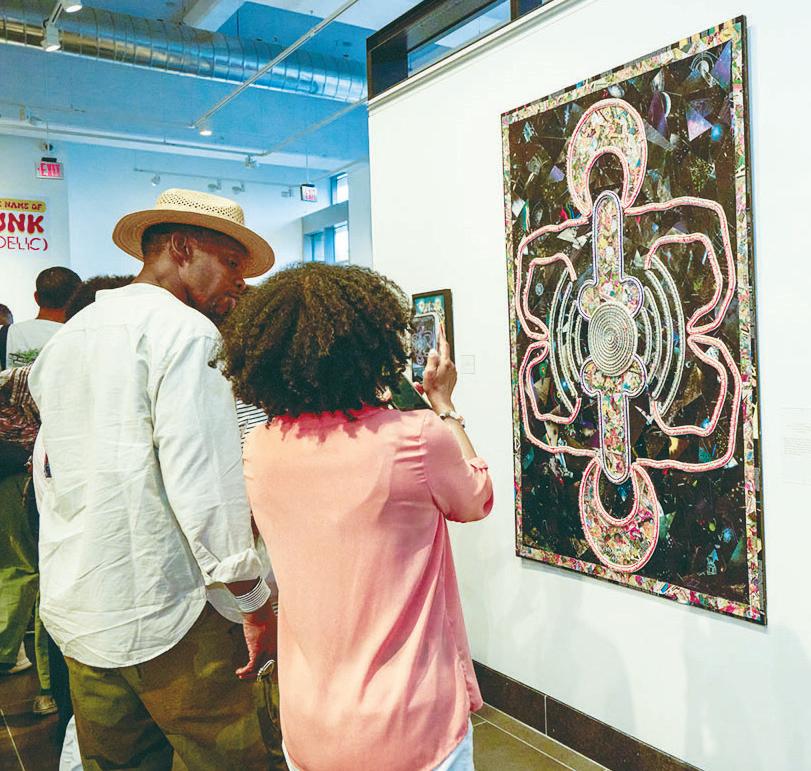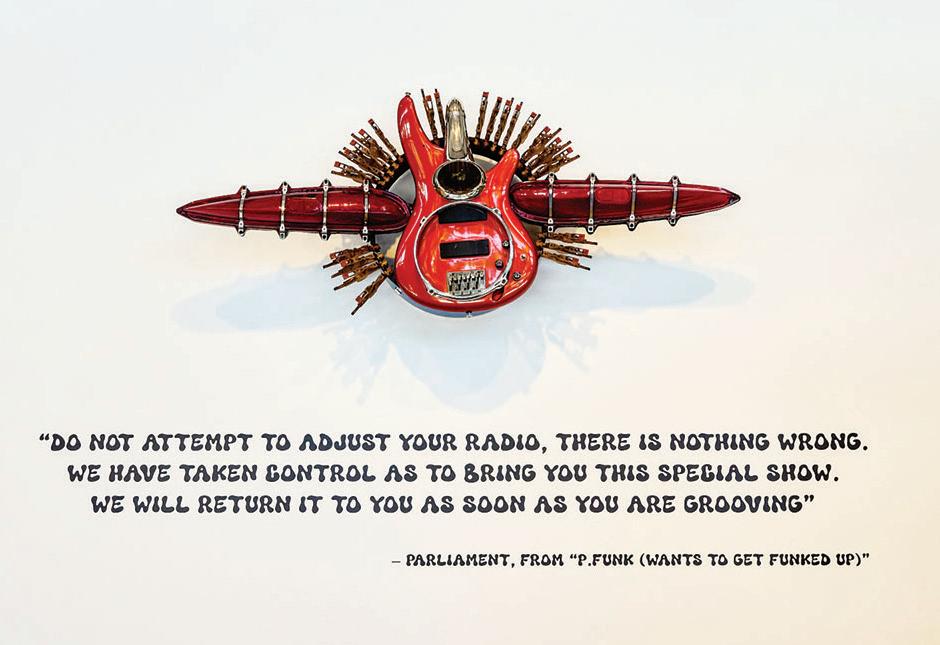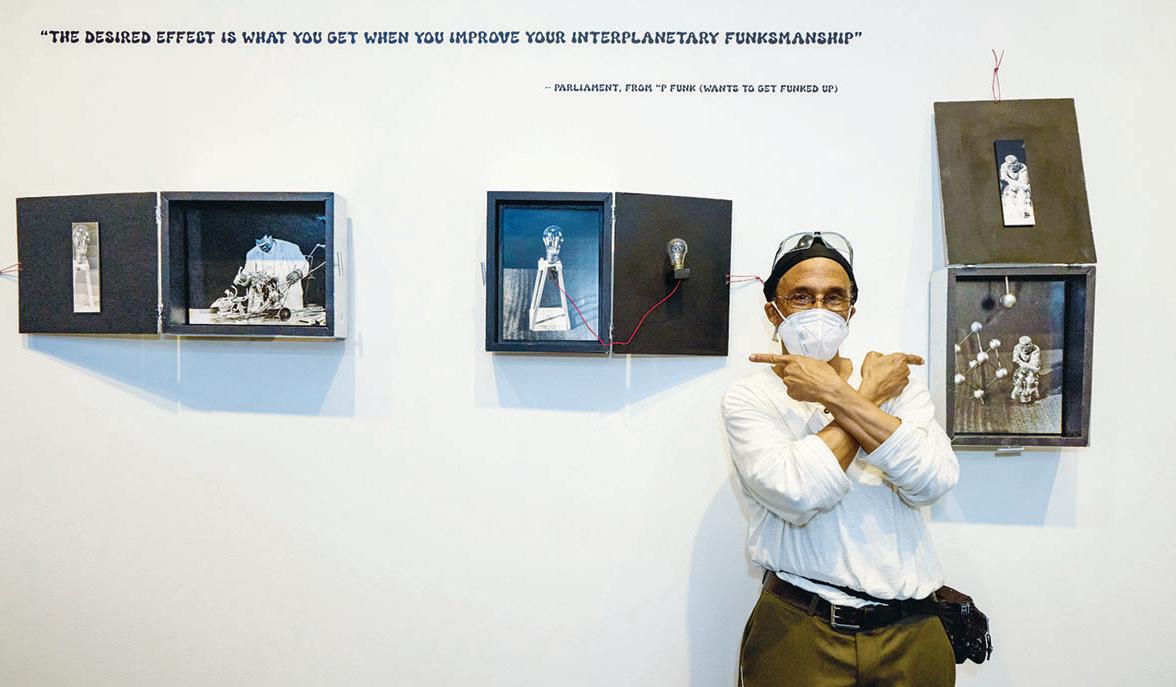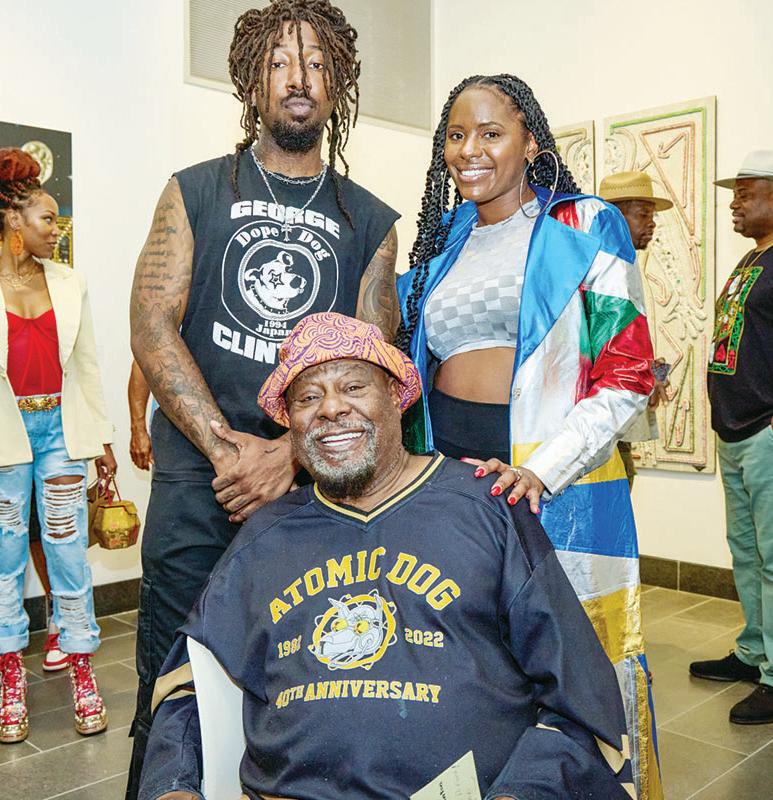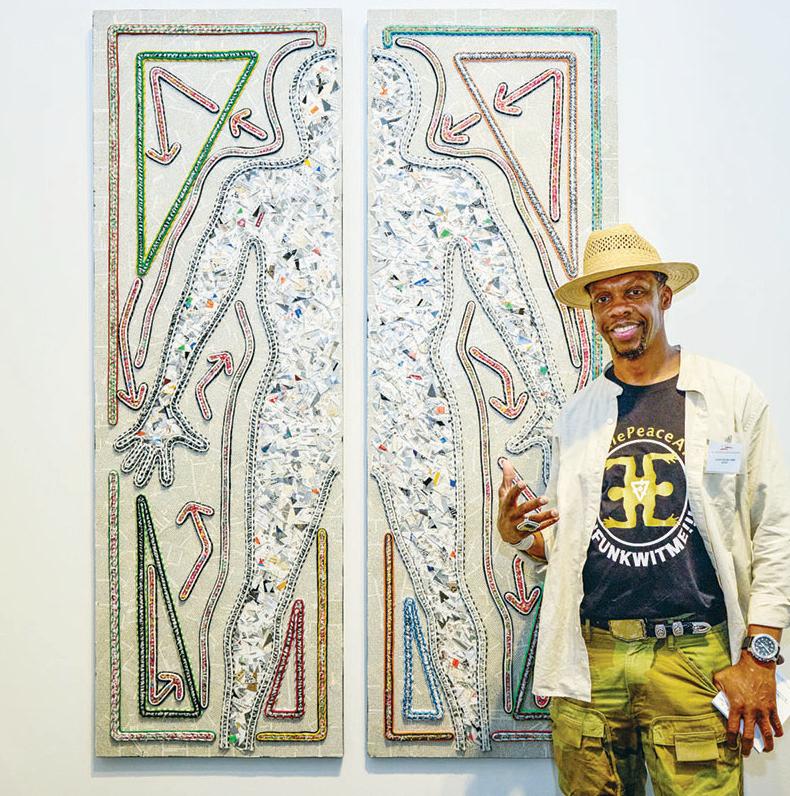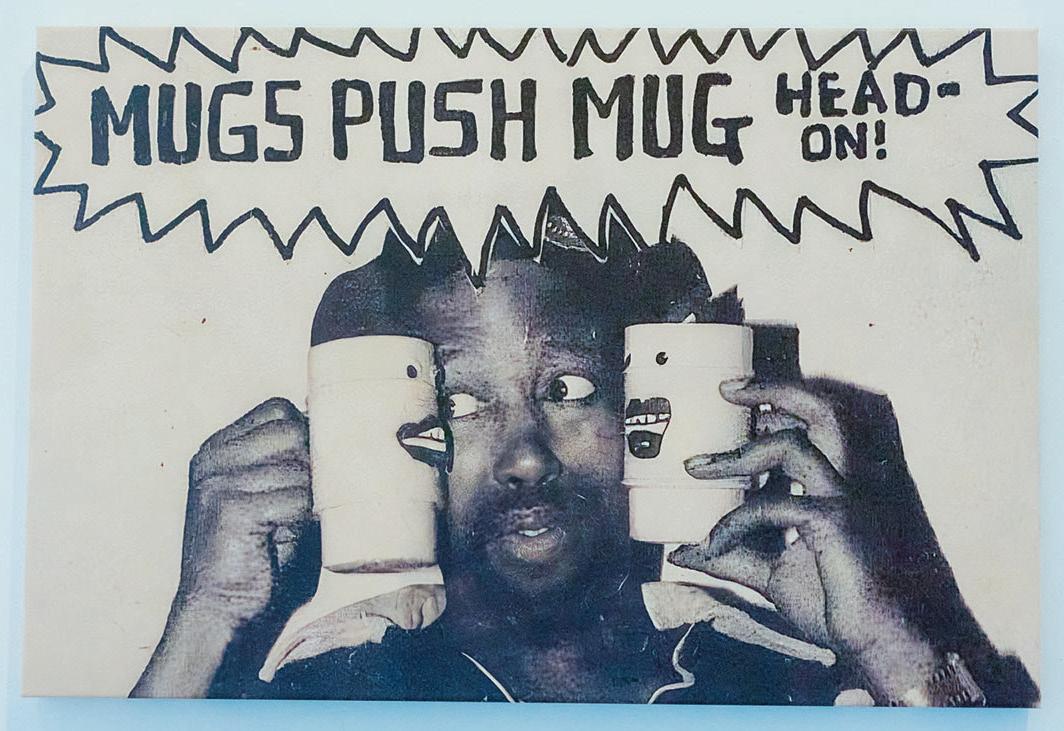








Initiative now underway to reach 15 million poor, low-wage, infrequent voters
By D. Kevin McNeir Special to the AFRO
When national faith leaders, including Poor People’s Campaign co-chairs, Bishop William J. Barber II and the Rev. Dr. Liz Theoharis, held a press conference on June 10 at First Congregational Church Sanctuary in Northwest D.C., their goal was to drum up support for the June 29 “Mass Poor People’s and LowWage Workers Assembly and Moral March on Washington, D.C. and to the Polls.”
The vision was realized just days ago, after thousands descended on the capital in support of economic justice and voting rights.
Barber and his colleagues were not disappointed with the level of commitment and passion displayed by those in attendance on Saturday, June 29 – men and women represent-
ing their home states that included New Jersey, Alabama, California, New York and more than a dozen others.
Speakers both at the microphone and in the crowd seemed to have one thing in mind: devising and following a strategy that will force America’s political elite to take notice of the needs of the poor.
“Congress can pass legislation providing $20 million for war but cannot pass a budget to house the homeless. We deserve a place to live and we will take our demands to the ballot box this fall,” said Bryant.
One attendee, Patricia Bryant, shared her view in the form of a spoken word manifesto.
“Dearly beloved, 140 million people are gathered here and across the nation to form a more perfect union – that man and women who struggle daily to stay alive yet pov-
By Megan Sayles AFRO Business Writer msayles@afro.com
“In this time, poor people, low-wage workers, religious leaders and moral advocates are bringing our voices together to tell America that we’re ready for protest and agitation in the street; litigation in the court and legislation in the suite; and we’re bringing our massive swing vote to the ballot box.”
erty is the way they die,” she said.
“We are strong– not weak. Our votes are our voices. The ballot box should be our choice. We will lift ourselves up from the bottom and rise. And we will demand that America give this
land of the free back to the people –to the natives – to the poor.”
Similar to the first Poor People’s Campaign, a two-week initiative that began on Sunday, May 12, 1968, this year’s Campaign and March brought
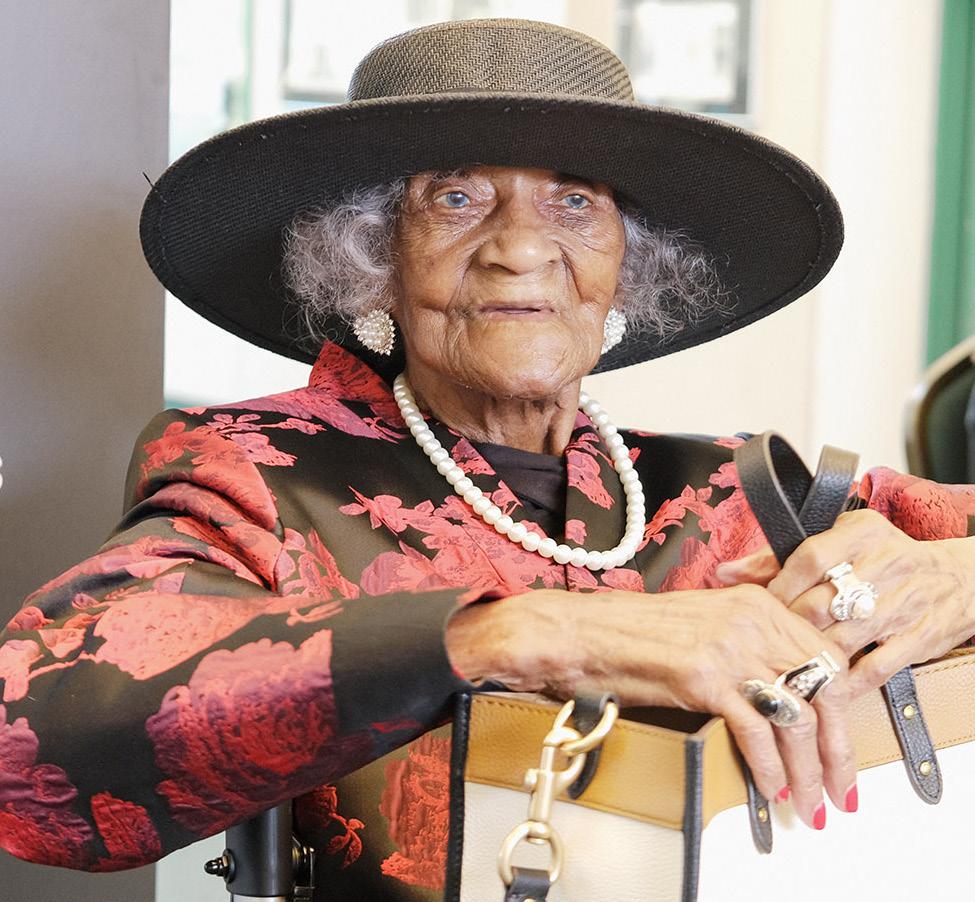
hundreds of activists and concerned citizens back to the National Mall. The first march included powerful sermons, speeches and personal testimonies about the myriads of challenges faced by the poor.
Exactly 56 years later, what began as a labor of love by Coretta Scott King and the Rev. Dr. Ralph Abernathy, following the tragic death of Dr. Martin Luther King Jr. on April 4, continues.
However, unlike in 1968, Barber and his colleagues are employing a new strategy that significantly expands the goals of the Poor People’s Campaign.
Armed with a 17-point agenda, Barber said they will call on all candidates running for elected office in the 2024 general election in November to step up and answer the needs
It’s been more than a century since a White mob looted, bombed and burned down Greenwood’s thriving Black Wall Street in Tulsa, Okla., destroying one of the wealthiest African-American communities in the country. Still, no trial has been conducted, and no one has been held legally responsible for what experts consider one of the most severe instances of racial violence in U.S. history. In June, the Oklahoma Supreme Court upheld a 2023 decision made by a Tulsa district court judge, Tulsa race massacre survivors call for DOJ investigation after dismissal of reparations case


By Stacy M. Brown NNPA Newswire
CNN has come under fire for denying media credentials to every Black-owned media entity, including those based in Atlanta, for the presidential debate on June 27. Despite granting over 600 media credentials, not even one was extended to Black-owned outlets, sparking outrage and accusations of systemic exclusion in a predominantly Black city.
The rejection has ignited a firestorm of criticism, highlighting the broader issue of racial inequity in media representation. Atlanta, a city with a rich history of Black culture and leadership, finds its Black-owned media sidelined at a critical political event.
The National Newspaper Publishers Association (NNPA), a leading voice for Black-owned media, revealed a letter from CNN rejecting their request for credentials. In an email, CNN’s Dylan Rose said the network could provide the Black Press transcripts and photos from the debate.
The NNPA represents the 197-year-old Black Press of America, which counts The Atlanta Voice, Atlanta Daily World and the Atlanta Inquirer among its more than 230 newspapers and media companies. The popular Rolling Out magazine also counts among the Black Press’ members frozen out by CNN.
Media personality and Black Star Network owner Roland Martin tweeted that his phone had been “buzzing from Black-owned media

of
2023-2024 election
outlets in Atlanta who say they are being denied media credentials to the debate.”
The prolific news leader further noted, “They don’t care about us. This is despicable. The treatment of Black-owned media is pathetic.”
Added NNPA President and CEO Dr. Benjamin F. Chavis Jr., “CNN’s decision is an affront to the very essence of press freedom and diversity. In a city where Black voices and perspectives are essential, this exclusion is both a slap in the face and a stark reminder of the ongoing struggles for equitable media representation.”
The timing and nature of the rejection letter have only fueled the outrage. Despite having ample time and resources to accommodate a diverse range of media outlets, CNN’s refusal to include Black-owned entities suggests

Your History • Your Community • Your News
The Afro-American Newspapers
Baltimore Office • Corporate Headquarters
233 E. Redwood Street
6th Floor, Suite 600G
Baltimore, Maryland 21202
410-554-8200 • Fax: 410-554-8213 afro.com
Founded by John Henry Murphy Sr., August 13, 1892
Chairman of the Board/Publisher - Frances Murphy Draper
(Publisher Emeritus - John J. Oliver Jr.)
President - Benjamin Murphy Phillips IV
VP of Marketing and Technology - Kevin E. Peck
Director Digital Solutions - Dana Peck
Receptionist - Wanda Pearson - 410-554-8200, ext. 246
Director of Operations Andrè Draper - 410-554-8200
Director of Finance
Bonnie Deanes - 410-554-8242
Executive Director/Director of Advertising
Lenora Howze - 410-554-8271 - lhowze@afro.com
Director of Community & Public Relations
Diane W. Hocker - 410-554-8243
Editorial
Managing Editor - Alexis Taylor - 410-554-8257
Special Projects Editor - Dorothy Boulware - 410-554-8231
Editorial Assistant - Ama Brown-Parson
Archivist - Savannah Wood- 410-554-8277
Baltimore Circulation/Distribution Manager
Andrè Draper - 410-554-8200
Production Department - 410-554-8200
Washington Office 1140 3rd Street, N.E., 2nd Floor Washington, D.C. 20002-6723 202-332-0080 • Fax: 410-554-8213
(Washington Publisher Emerita - Frances L. Murphy II)
Director of Operations - Andrè Draper - 410-554-8200
Customer Service, Home Delivery and Subscriptions: 410-554-8200
a troubling oversight or, worse, a deliberate and overtly racially-motivated dismissal.
for decades, expressed their frustration and disappointment with collective assertions
“CNN’s decision is an affront to the very essence of press freedom and diversity.”
that CNN has intentionally overlooked the heartbeat of the city’s news and culture.
The exclusion comes at a time when media diversity and representation are under intense scrutiny.
Advocacy groups and community leaders have also called for immediate corrective actions from
CNN. Other major networks to ensure that Black-owned media entities are not just included but are given the respect and opportunities they deserve. In the wake of the debate, the spotlight remains not just on the candidates but also on the institutions that shape public discourse. CNN’s decision cast a long shadow over the debate, raising critical questions about who gets to tell the story and who gets left out.
“Our exclusion from this pivotal event is not just an insult to our organizations but to our readers and viewers who rely on us for their news,” Chavis argued.
This article was originally published by NNPA
Four Missouri prison guards charged with murder, a fifth with manslaughter, in the pepper spray death of a Black man
By Summer Ballentine and Michael Goldberg
The Associated Press
Four Missouri prison guards were charged June 28 with murder, and a fifth with accessory to involuntary manslaughter, in the December death of a Black man who was pepper sprayed, had his face covered with a mask and was left in a position that caused him to suffocate while in custody at a correctional facility, according to a complaint filed June 28.
A group of guards making up the Department of Corrections Emergency Response Team was sweeping one of the housing units for contraband on Dec. 8, 2023.
Othel Moore Jr., 38, was pepper sprayed twice, then put in a spit hood, leg wrap and restraint chair. According to a news release from Cole County Prosecuting Attorney Locke Thompson.
Moore was then moved to a separate housing unit, where he was left in a locked cell in the hood, wrap and chair for 30 minutes, according to Thompson and probable cause statements. Thompson said multiple people heard him saying he couldn’t breathe.
Moore was eventually taken to a hospital wing and was pronounced dead. Thompson said the medical examiner ruled Moore’s cause of death was from positional asphyxiation, and his death was listed as a homicide. He confirmed the events were captured on the prison’s video surveillance system.
“After sitting down and reviewing all evidence, the dozens and dozens of interviews, all the reports, we determined that charges were appropriate,” Thompson told The Associated Press.
The complaint charges Justin Leggins, Jacob Case, Aaron Brown and Gregory Varner each with one count of second-degree murder and with one count of being an accessory to second-degree assault. A fifth guard, Bryanne Bradshaw, is charged with one count of accessory to involuntary manslaughter.
Those charged with felony murder could face between 10 and 30 years in prison, Thompson said.
Thompson said all five defendants are jailed. Multiple
phone calls to numbers associated with the defendants and potential relatives were not answered June 28. Thompson said Case is the only one with a lawyer so far, but Thompson could not identify the attorney. A voice message requesting comment from the corrections officers union was not immediately returned June 28.
An attorney for Moore’s family, Andrew Stroth, has said Moore had blood coming out of his ears and nose.
“There’s a system, pattern and practice of racist and unconstitutional abuse in the Missouri Department of Corrections, and especially within the Jefferson City Correction Center,” Stroth said, adding: “It’s George Floyd 3.0 in a prison.”
After Moore was searched for contraband and stripped down to his boxers by other guards inside his cell, he was handcuffed behind his back and led outside. According to affidavits by Cole County Sheriff’s detectives.
Moore was ordered to be quiet, and when he questioned why, Leggins pepper-sprayed his face, according to affidavits.
“During a subsequent interview with Leggins, he stated that he deployed his pepper spray on the victim because he was not following directives to be quiet,” a detective wrote in an affidavit. “He then stated that he felt threatened because the victim turned towards him and ‘stepped’ or lurched at him.”
But detectives wrote in affidavits that video showed Moore was only turning his head to speak.
Another officer, Case, sprayed Moore a second time in the face for what he said was noncompliance, according to affidavits. Officers then restrained Moore’s legs with a restraint system known as a WRAP.
Officers said they then put a spit mask on him because he spit at them, according to detectives. But other staff said Moore was spitting pepper spray out of his mouth, according to affidavits.
Detectives said multiple officers heard Moore crying out for help after the mask was put on, and one heard Moore say
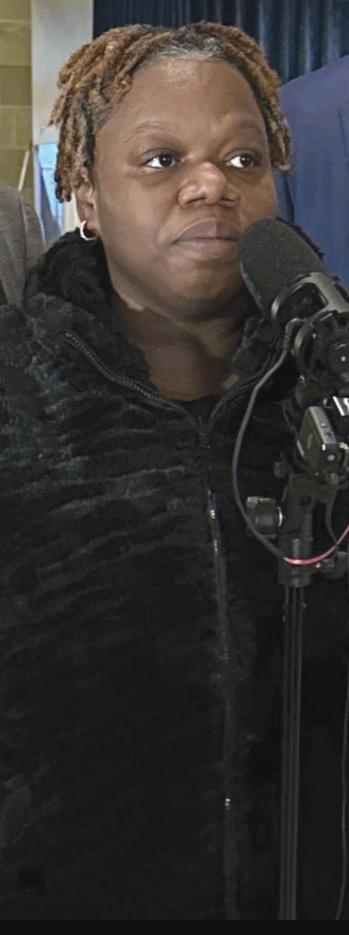
Oriel Moore describes life without her brother, 38year- old Othel Moore Jr., to reporters, Dec. 19, 2023, at the Missouri Capitol building in Jefferson City, Mo. Four Missouri prison guards have been charged with murder, and a fifth with involuntary manslaughter, in his December 2023 death while he was in custody at the Jefferson City Correctional Center.
he has asthma.
Moore then was taken to another cell and was not checked on for another 20 minutes, according to detectives. Department of Corrections staff did not evaluate or provide medical assistance to Moore until he became unresponsive, the deputies wrote.
Moore showed no aggression during the process and was complying with orders, affidavits said.
Lawyers for Moore’s mother and sister filed a wrongful death lawsuit June 28 against the officers and the Department of Corrections.
The Moore family’s lawyers described the Corrections Emergency Response Team — who interacted with Moore — as “a group that uses
coercive measures to brutalize, intimidate and threaten inmates” in a copy of the lawsuit provided to AP.
The lawsuit describes Moore’s death as part of “a systematic practice of fearmongering, infliction of pain, and intimidation tactics.”
The Missouri Department of Corrections released a statement June 28 saying Moore died in a restraint system designed to prevent injury to himself and others, and that the department has discontinued using that system.
The corrections department also said after the criminal investigation and its own internal review, 10 people involved in the incident “are no longer employed by the department or its contractors.”
The department said it “will not tolerate behaviors or conditions that endanger the wellbeing of Missourians working or living in our facilities. The department has begun implementing bodyworn cameras in restrictivehousing units at maximumsecurity facilities, starting with Jefferson City Correctional Center, to bolster both security and accountability.”
Oriel Moore, Othel Moore’s sister, said her family never had a chance to see Othel Moore outside of prison after his childhood, adding to their heartbreak.
“He won’t get to live his life, he doesn’t even know what it is to be a grown man because he’s been in there since he was a kid,” Moore said. “He had plans. He wanted to be a productive member of society. He matters. His life matters.” Moore, who grew up in St. Louis, was serving a 30-year sentence on a range of charges.
An AP investigation into lethal restraint used by law enforcement documented dozens of deaths between 2012 and 2021 in which officers had put someone in a spit mask or hood before they died. But those devices were rarely listed as a cause or contributing factor in the deaths.
Associated Press writer Ryan J. Foley contributed to this report from Iowa City, Iowa and researcher Rhonda Shafner contributed from New York. This article was originally published by The Associated Press.
By Catherine Pugh Special to the AFRO
Over 200 people crowded into the newly built Thurgood Marshall Amenity Center for a grand opening celebration on July 2. The date of the event coincided with what would have been the 115th birthday of the late U.S. Supreme Court Justice Thurgood Marshall, who called Baltimore “home.”
Located at 1315 Division Street in Baltimore, the center represents the completion of the first building in a $50 million dollar initiative planned under the leadership of Dr. Alvin C. Hathaway Sr., president and CEO of the Beloved Community Services Corporation.
President of the Finn Group, LaRian Finney, served as master of ceremony for the event, and the program began and ended in prayer by Bishop Dennis Proctor of the AME Zion Church.
The emotional opening of the building featured news clippings with remarks by United States Supreme Court Justice Thurgood Marshall, the first Black man appointed to America’s highest court in 1967. Marshall was appointed by then U.S. President Lyndon B. Johnson and served 23 years.
Among the attendees were several elected officials including Congressman Kweisi Mfume (D-Md.-07), Speaker of the Maryland State House Adrienne Jones (D-Md.-10), State Senator Antonio Hayes (D-Md.-40), Mayor of Baltimore City Brandon Scott and Baltimore City State’s Attorney Ivan Bates.
Mfume, who lived on Division street in his childhood, recalled meeting Thurgood Marshall in his office at the Supreme Court.
“He told me he had received a call from Congressman Parren Mitchell, who let him know I had lived in the neighborhood. I came with the new congressman who had been elected and he reminded us to never give up the fight for equality,” he said.
African Ambassadors from the Republic of Ghana, Rwanda and Tanzania were also in attendance. Her Excellency Dr. Elsie Sia Kanzaa, Ambassador of Tanzania spoke about the power of uniting around a common cause.
“While Justice Marshall did not work directly with Tanzania, his work touched Tanzanians as he was working closely with our African brothers and sisters, striking for common cause, ending colonization and oppression and [standing] with us in our social justice and struggle for independence,” said

Her Excellency. “We thank Baltimore for giving us all Justice Marshall.”
Dr. Hathaway wasted little time in thanking everyone, beginning with his wife and family, which included third generation members.
He also extended his gratitude to those who protected the project, from former mayors to current leader Brandon M. Scott, who spoke and thanked Dr. Hathaway for remaining committed to the project and the Thurgood Marshall legacy goal of equality.
As an example of the need for such a center, Mayor Scott commented on the Supreme Court’s recent 6-3 decision to allow former President Trump immunity from some prosecution related to actions taken while in office on Jan. 6, 2021 before, during and after the U.S. Capital insurrection.
“We must not give up the fight for dignity [and] equality–we must go deeper. If we don’t, many– if not all– of the things that Justice Thurgood Marshall toiled and worked for and accomplished will simply die because of our silence,” said Scott. “Let us continue in the fight the way he would want us to.”
Aside from Hathaway and Scott, additional remarks were given by the presidents from local universities including, Darryll Pines, of University of Maryland, Bruce E. Jarrell, president of University of Maryland Baltimore, and former Mayor of Baltimore and President of the University of Baltimore, Kurt Schmoke.
Continued from A1
of the poor.
“In this time, poor people, low-wage workers, religious leaders and moral advocates are bringing our voices together to tell America that we’re ready for protest and agitation in the street; litigation in the court and legislation in the suite; and we’re bringing our massive swing vote to the ballot box,” Barber said. ”We are not accepting the silence from the media and political establishment that ignores 800 daily deaths of poor and low-wealth people. Together, we will take this nation to higher ground.”
A look at the numbers reveals America’s burgeoning working poor
Barber’s co-chair, the Rev. Dr. Theoharis, emphasized her colleague’s words.
“Poverty is a death sentence in the United States and it doesn’t have to be this way,” she said.
According to a 2021 report by the Brooking Institution, the pandemic hurt low-wage workers the most – and so far, the recovery has helped them the least.
The report defined lowwage occupations as those with a media hourly wage no greater than $17.50 per hour. Further, it is estimated that 53
million Americans ages 18 to 64 – 44 percent of all workers – earn low hourly wages. Their median hourly earnings are $10.22 and for those working full time year-round, median annual earnings are about $24,000.
While other Americans are optimistic about life in the “new normal” era of post pandemic life – the U.S. Bureau of Labor Statistics reveals that minimum wage workers have little chance of escaping the throes of poverty – at least not without state- or federal-based programs.
Keith Bullard, deputy director for the Union of Southern Service Workers, said he’s had enough.
“When workers’ rights come under attack, we fight back,” he said. “Workers today are being forced to work in this oppressive heat while we should be protected from it. Because of the negligence of our employers – the big corporations – workers are being denied even the most basic of needs. America’s major corporations make billions of dollars, so they have the money to do what’s right. But we know that the only way they’ll do the right thing for workers is if we are willing

to stand up, keep standing up, speak up and continue to speak up,” Bullard said.
In 2022, 78.7 million workers, 16 and older in the U.S. were paid at hourly rates, representing 55.6 percent of all wage and salary workers. Among those paid by the hour, 141,000 workers earned exactly the prevailing federal minimum wage of $7.25 per hour. About 882,000 workers had wages below the federal minimum. Together, these 1.0 million workers with wages at or below the federal minimum made up 1.3 percent of all hourly paid workers – little or
Continued from A1
The Thurgood Marshall Amenity Center, formerly known as Public School 103, was an elementary school located three blocks from Supreme Court Justice Marshall’s childhood home, which is located at 1632 Division Street.
A highlight of the evening was the announcement of the Thurgood Marshall Lecture series, by Mary Miller, which will take place at the Thurgood Marshall Amenities Center on Sept. 25. Members of the Maryland House of Delegates also unveiled a painting of the three African American Congressmen, Parren J. Mitchell, Kweisi Mfume and Elijah Cummings, that will hang in the center.
The final highlight before the ribbon cutting was the announcement of a $2 million pledge by the Carmelo Anthony Foundation, announcing the naming rights to the front of the building.
As the ceremony came to a close , Dr. Alvin C. Hathaway Sr. announced the goal of raising $3.5 million with pledge cards being made available for all attendees.
He expressed high hopes for the future of the center as well as the history being passed down.
“Justice Thurgood Marshall should be to Baltimore [what] the Reverend Martin Luther King Jr. is to Atlanta,” said Hathaway.
The new center will house several training opportunities, including sessions in artificial
no change from 2021.
America’s poor advised to vote for the change they require Barber emphasized that poor people — whether they identify as Democrats, Republicans or Independents – represent one of the largest untapped voting blocs in the country. Based on statistics compiled by the Poor People’s Campaign, he posited that poor and low-wealth people do not vote to their full potential, even though they represent nearly 30 percent of the national electorate and close to 40 percent of voters in
dismissing a case for reparations led by those who lived through the race riot. The two remaining survivors, 110-yearold Viola Fletcher and 109-year-old Lessie Benningfield Randle, denounced the decision and called for a federal investigation into the massacre on July 2.
“Although our quest for justice in Oklahoma may be over, for as long as we remain in this lifetime, we will continue to shine a light on one of the darkest days in American history. But, we know there is more that can be done,” said Randle and Fletcher, in a statement read by McKenzie Haynes, a member of the women’s legal team. “We ask the United States Department of Justice to intervene, open an investigation into the massacre and do what Oklahoma has never done. It’s not too late to do the right thing.”
intelligence by Career Communications, financial literacy sessions by Bank of America, and skills and job training supported by Ricky Smith, CEO of the BWI Thurgood Marshall Airport. Judge Alexander Williams Jr. announced that a division of his center for education, justice and ethics will provide training at the Thurgood Marshall Amenity Center.
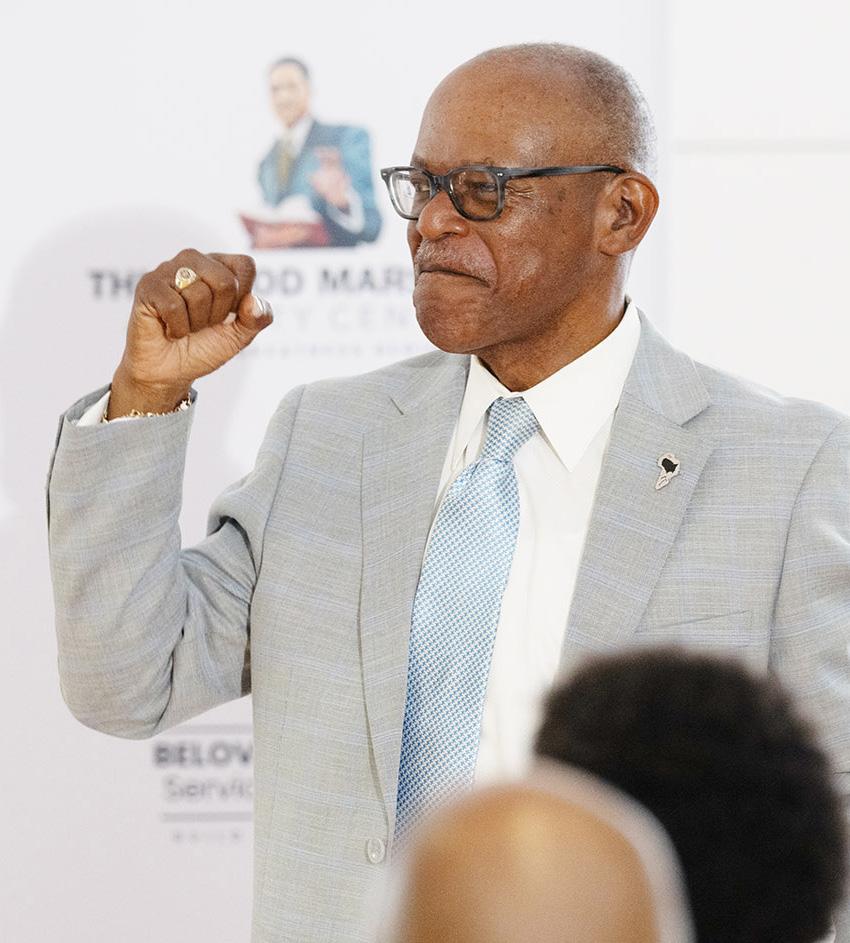
Dr. Alvin C. Hathaway Sr. is president and CEO of the Beloved Community Services Corporation, which spearheaded efforts to open the Thurgood Marshall Amenity Center.
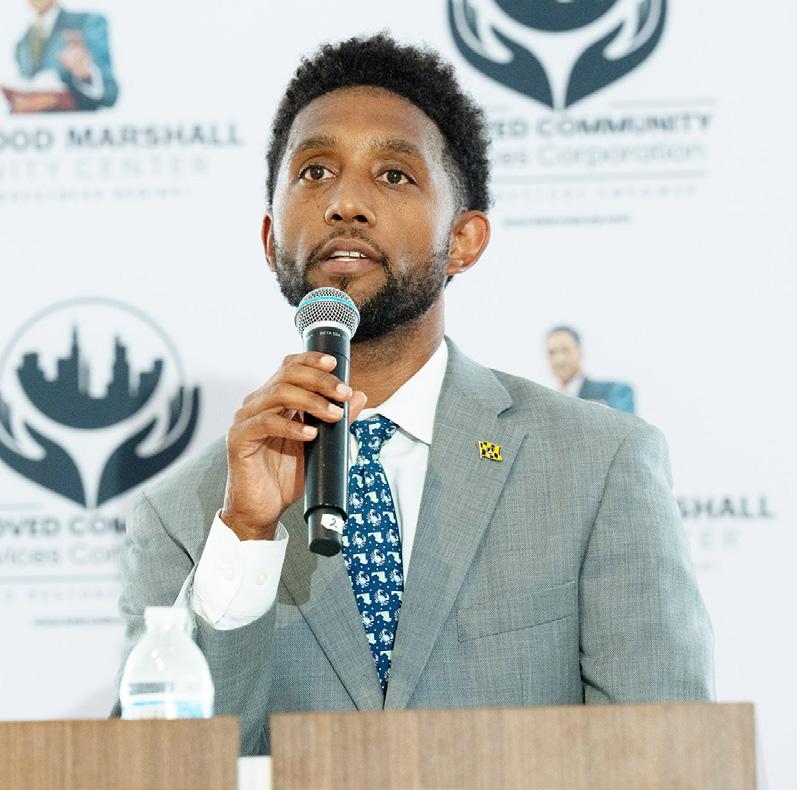
Mayor Brandon Scott speaks at the Thurgood Marshall Amenity Center on July 2. Over 200 people gathered to celebrate the opening of the building, which honored the late civil rights leader, Thurgood Marshall, on what would have been his 115th birthday.
battleground states. He then challenged listeners to consider what would happen if the poor were to vote with full strength – how they could give their support only to candidates who endorsed policies critical to them and to others facing poverty –from voting rights and raising the federal minimum wage to housing issues, LGBTQ+ rights and climate change.
“Like the Prophet Moses, honored by Jews, Muslims and Christians, led the people out of bondage of Egypt, it’s time to rise,” Barber said. “Like the dry bones in the valley of
parameters of the statute.
Ezekiel’s vision, we’ve got to rise.”
One participant at the March and a fellow minister, the Rev. Hannah Broome, agreed with Barber saying the time to make their demands is now.
“As moral leaders, we cannot afford to waste time when the cries of the oppressed call for immediate action,” she said. “We are the swing vote that can steer our nation toward compassion, shift the political landscape for all and not just the few and can ensure that all voters have equal and guaranteed voting rights.”
The Oklahoma Supreme Court voted 8-1 to uphold the decision on June 12. Aside from soliciting the help of the DOJ, Randle and Fletcher’s legal team have filed a petition for a rehearing in the court.
“It’s not too late to do the right thing.”
Randle and Fletcher were young girls when they witnessed the destruction of their community. They have both described the long-lasting financial and emotional distress that the massacre caused them and their families. On that May day in 1921, more than 1,400 homes and businesses were burned, leaving almost 10,000 people homeless, according to Brittanica. As many as 300 people died, most of them African Americans.
The pair, along with Fletcher’s late brother Hughes Van Ellis, sued the city of Tulsa for reparations in 2020 under Oklahoma’s public nuisance law. But, Judge Caroline Wall dismissed the case last year, saying it failed to meet the legal
“We are profoundly disappointed by the Oklahoma Supreme Court’s decision ro reject our lawsuit, and we are deeply saddened that we may not live long enough to see the state of Oklahoma or the United State of America honestly confront and right the wrongs of one of the darkest days in American history,” said Randle and Fletcher in their statement. “At 109 and 110 years old, we are weary, and we know that we are living in borrowed time.” In 2021, the 100th anniversary of the Tulsa race massacre, President Joe Biden met with Randle, Fletcher and Ellis. Lead attorney Damario SolomonSimmons said the president promised the survivors that they would get justice.
He asked the president to honor the vow.
“Now that we have been failed by the courts and by Congress, we are calling upon President Biden to fulfill his promise to these survivors, to this community and for Black people throughout this nation,” said Solomon-Simmons. “We hurt for the survivors, we hurt for the descendants and we hurt as a national Black community for the destruction of Greenwood.”

By Keith Boykin
Well, that was awkward.
The first presidential debate of the 2024 campaign felt like a disservice to the public. Donald Trump lied and rambled nonstop without correction. And President Joe Biden was simply not able to keep up with Trump’s torrent of falsehoods.
It was the first time in history a convicted criminal took part in a presidential debate, but it was 40 minutes into the discussion before Trumps criminal history was brought up. It was as if it were completely normal for a twice-impeached, quadrupleindicted, convicted felon awaiting sentencing, who also incited a deadly insurrection, to be considered a serious candidate for the most powerful job in the world.
But the spectacle likely did nothing to move the needle: Biden’s shaky performance did not allay concerns about his age, and Trump’s nonsensical tirades did not allay concerns about his mental or moral fitness to hold office.
After the first half hour, Biden finally had a few good moments, attacking Trump as a criminal, condemning him for “having sex with a porn star while your wife was pregnant,” and accusing him of having “the morals of an alley cat.” But Trump is a master at denying the truth, dodging questions, inflating his own record, and lying about other
people as he pivoted to his favorite talking points.
Asked about Black voters, Trump blamed immigrants for taking what he called “Black jobs.” First of all, that’s not true, but second: what, exactly, are Black jobs?
In the same round, Biden missed a golden opportunity to sell his own record on Black issues: lower Black unemployment, lower Black poverty, more Black businesses, more HBCU funding, more Black judges, less student loan debt, and historic appointments to his cabinet.
Trump blithely walked past his own history of housing discrimination in the 1970s, the lynch mob he led against the now-exonerated “Central Park Five” in the 1980s, and the birtherism lie he peddled about President Barack Obama for nearly six years. Biden did cite a few examples of what he’s done for Black voters, but he let Trump put him on the defensive on an issue where Trump’s own record is abysmal.
This is especially true in Atlanta, the predominantly-Black city that Donald Trump attacked before and after he lost the 2020 election, and tried to invalidate the votes of Black residents.
Trump even targeted Fulton County election workers Ruby Freeman and Shaye Moss, both Black women.
But there was no mention of that in the debate — in Atlanta. Trump was not forced to answer
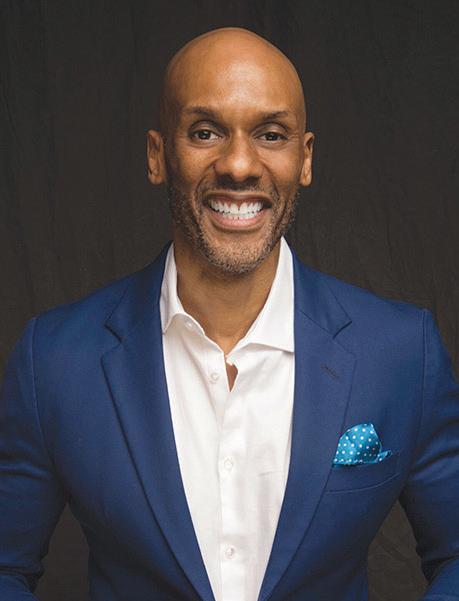
Keith Boykin is a New York Times bestselling author, television and film producer, and former CNN political commentator. A graduate of Dartmouth College and Harvard Law School, Keith served in the White House, co-founded the National Black Justice Coalition, co-hosted the BET talk show “My Two Cents,” and taught at the Institute for Research in African-American Studies at Columbia University in New York. He’s a Lambda Literary Award-winning author and editor of seven books.
for his bigoted attacks on the late Rep. John Lewis — a civil rights icon — and current Fulton County District Attorney Fani Willis. It didn’t stop there. When asked about child care, Trump avoided the question,
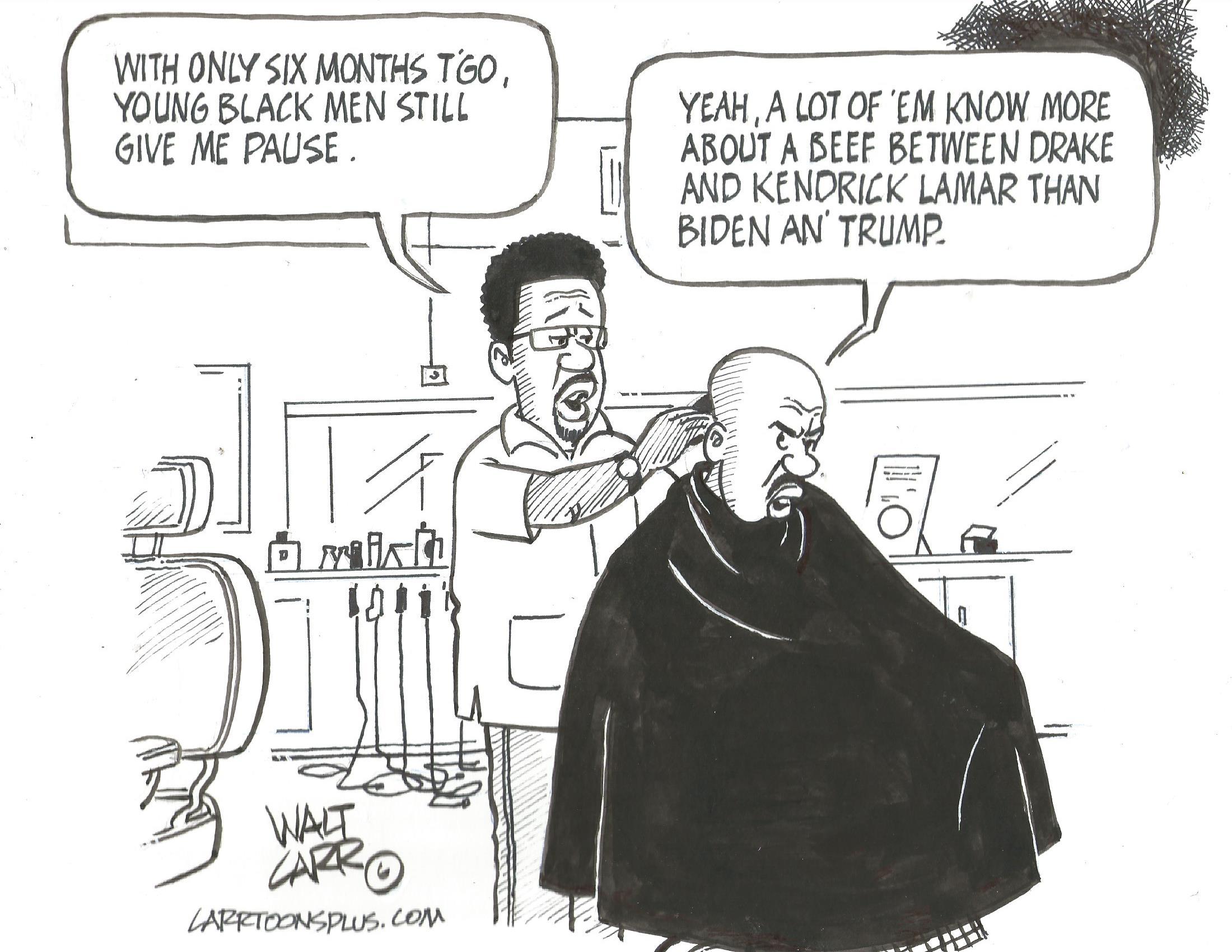
rambled off into immigration lies, and spoke about how he fires people. Not one word about child care. And no one held him accountable.
When asked about the opioid crisis, Trump went on and on about irrelevant issues and again failed to provide a single substantive idea, much less give a coherent answer. Asked a second time about the opioid crisis, Trump brought up Vladimir Putin releasing hostages.
When asked about a
Palestinian state, Trump did not even pretend to answer the question. He just launched into a rant about NATO. And after all that, Trump still refused to say he would accept the election results this November.
President Biden should have mopped the floor with Trump tonight, but he did not. Then, after the debate, Biden showed up at a rally and looked like a different person — refreshed and energized in a way that he was not during the debate.
I don’t know what just happened, but it’s going to be a long four months, and an even longer four years if things keep going in this direction.
This article was originally published by Word In Black. “Black Vote, Black Power,” a collaboration between Keith Boykin and Word In Black, examines the issues, the candidates, and what’s at stake for Black America in the 2024 presidential election.
By Congressman Jonathan Jackson (D-
In a country where wealth disparities persist, financial inclusion is still the road that leads to equity. Black Americans have historically faced barriers to wealth generation and investment opportunities. Today, the tide is turning, and technology is paving the road to education, access and empowerment.
A myriad of new technologies continue to create more opportunities for our historically underserved communities to participate in the financial system, including in the areas of banking and investing.
What is financial inclusion?
At its core, financial inclusion is a term of hope. It aims to ensure all individuals and communities, regardless of socioeconomic background, have equitable access to affordable and reliable financial services
Ill.- 01)
to manage their finances, invest, save and build wealth.
For Black Americans, it represents a pathway to rectifying historical injustices and systemic barriers that have hindered economic progress for centuries. Financial inclusion is a prime facilitator of poverty reduction and a generator of financial stability for Black families to accumulate assets and create pathways to mobility.
Technology: A great equalizer
Access to modern technology is not universal, and the digital divide is a crucial example of how much we still need to achieve. But for many Black people throughout the country, technology provides an unprecedented opportunity to participate in the financial market.
Here’s how:
Access to information: The internet provides a wealth of knowledge previously kept from marginalized groups at a lower cost only technology can produce. Now, those groups can educate themselves about personal finance, investment strategies and wealth-building.
Mobile apps: Apps have transformed the way we connect with businesses and one another. Intuitive interfaces, quicker response times and overall enhanced user experience make apps a powerful tool for us to do business.
Financial literacy: Educational resources are available to empower individuals to make informed financial decisions, whether through e-newsletters, podcasts, webinars or online courses.
Digital banking: Online banking allows for more convenient and cost-effective money management. No longer tied to physical branches, underserved communities can transact, save, and invest from anywhere.
Fintech: With the convergence of finance and technology, Fintech is leveraging digital platforms to create innovative solutions to democratize financial services. Companies like Robinhood have enabled a new wave of investors to participate in the stock market without costly trading commissions and high account minimums.
According to the ArielSchwab Black Investor Survey conducted in 2022, trust in technology surpasses trust in people when it comes to managing assets. Young Black investors are leading the charge,
with three times as many investing in the stock market for the first time in 2020, compared to their White counterparts. Additionally, 29 percent of Black investors under 40 were new to investing in 2020, compared to 16 percent of White investors. Federal Reserve data reinforces this trend. In 2022, 58 percent of American households owned stocks. Notably, Black and Hispanic investors increased their participation significantly, both almost doubling since 2019.
The road ahead
The Black community stands at the forefront of this era, where under-resourced communities embrace their newfound access to the financial landscape. But despite increasing literacy and inclusion and the combined efforts of our political leaders, including the Congressional Black Caucus and the Financial Services Committee, and recent
legislation like the “Financial Innovation and Technology for the 21st Century Act” (FIT21), history has taught us that our continued progress isn’t guaranteed.
See more on afro.com
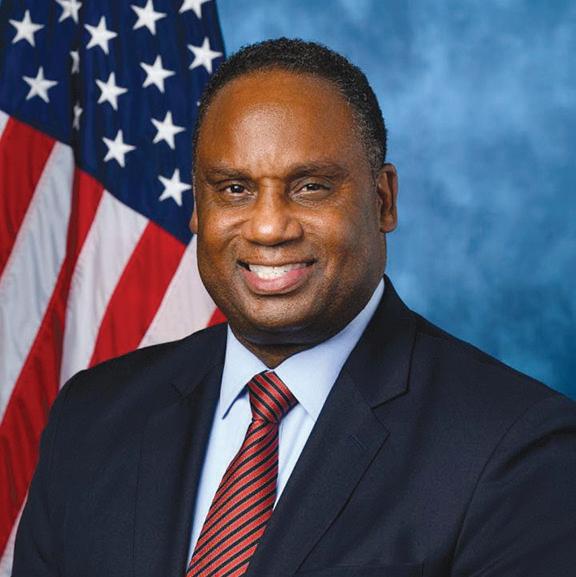
By Ashley Estelle
Angela Alsobrooks, an attorney and the county executive of Baltimore County, was recently nominated for Maryland’s open U.S. Senate seat. Given that nomination, and the fact that current Vice President Kamala Harris is of Black descent, you might think that Black women are serving in the U.S. government in considerable numbers. Unfortunately, you’d be wrong. If Alsobrooks wins, she will become only the fourth Black woman ever to serve in the U.S. Senate.
Alsobrooks’ May 14th primary victory highlights an important moment for Black women in politics, reflecting ongoing progress and challenges. Her strength and determination— even in the face of racist and hateful attacks like vandalism on her campaign signs—mirror Black women’s convictions
throughout their long history of political involvement. As a Black woman myself, this recurring need for resilience hits particularly close to home for me, shaped not just by the broader strokes of history but by the intimate details of my upbringing. I vividly recall my mother proudly wearing her “I voted” sticker each time an election came around. Her interest in participating in the democratic process wasn’t just about casting a ballot; it was a unique expression of her belief in the power of collective voices to effect change in our country. Now, remembering those “I voted” stickers makes me realize that it was only a few generations ago that women in my family were constantly struggling to vote.
Even as the 19th Amendment was ratified in August of 1920, many Americans knew that African-American women would remain disenfranchised. Despite the amendment put in
place, discriminatory practices such as poll taxes, literacy tests, and outright intimidation continued to disenfranchise the black community, particularly in the South. Black women organized and participated in conventions and gatherings across the country to advocate for suffrage and other issues. Their initiatives became hubs of activism, fostering solidarity and pushing their voices in the fight for political rights and equity.
Ida B. Wells-Barnett, Sojourner Truth, Mary Ann Shadd Cary, and Mary Church Terrell were among the prominent Black suffragists. Their leadership and activism were instrumental in advancing the cause of suffrage, challenging both racial and gender discrimination.
The voting rights movement has often overlapped with human rights movements. Suffragists like Mary Church Terrell—a pioneering educator and the first president of the National Association of Colored
Women (NACW)—focused on voting and broader issues of equality and justice. During the abolitionist movement, enslaved and free Black individuals addressed women’s rights. They dealt with racism and sexism, often finding themselves marginalized and excluded from mainstream suffrage organizations. Despite those obstacles, there was continued persistence in their goal of equality and justice not just for themselves, but for all.
Presently, Black women have emerged as a powerful force in recent elections, demonstrating high voter turnout rates and playing roles in mobilizing voters. Our efforts were instrumental in securing victories for Joe Biden and Kamala Harris in 2020. Our collective power and commitment to political participation highlight the importance of amplifying Black women’s voices and representation in electoral
politics. The resounding support for Biden-Harris, with approximately 90% of Black women casting their ballots in their favor, underscores our influence on electoral outcomes. Despite Black women’s clear and demonstrated power as a voting bloc, many structural barriers hinder us from participating in politics as candidates and elected officials. Financial barriers to political candidacy, as articulated by City Council member Martha Castex Tatum, show the systemic inequities that persist within our political institutions. For example, former North Carolina state chief justice Cheri Beasley was given a small amount of party money in her campaign for the Senate in 2022. Yet, amidst these challenges, Black women activists continue to push the cause of voting rights.
Figures like Stacey Abrams, LaTosha Brown, and Leah Aden exemplify the commitment to combat voter
and expand access to the ballot boxes for underrepresented communities. See more on afro.com

By Tashi McQueen AFRO Political Writer tmcqueen@afro.com
President Joe Biden (D) and former President Donald Trump (R) participated in a much-anticipated debate hosted by CNN on June 27. Moderators and CNN Anchors Jake Tapper and Dana Bash asked questions about Black voters, foreign policy and the economy.
“There’s more to be done, considerably more to be done, but we’ve done a great deal so far,” said Biden, hoping to reassure Black voters during the debate held in Atlanta. “I don’t blame them for being disappointed, inflation is still hurting them badly. I provided for the idea that any Black family, firsttime homebuyer should get a $10,000 tax credit to be able to buy their first home. We’re going to do a whole lot more for Black families.”
According to a recent survey by the Pew Research Center, 77 percent of registered Black voters would rather vote for Biden in the 2024 election over Trump. As well, Black voters continue to align with the Democratic Party. About 83 percent of voters lean Democrat, while 12 percent identify as Republican.
controversial issues that a number of Americans are concerned about, such as his part in and his take on Jan. 6, 2021. Voters are also weary of Trump, should he lose the election. Many wonder would he accept this year’s election results no matter who wins, or launch a campaign to overturn the results like he did in 2020.
On the debate stage, Trump once again touted the idea that the 2020 election was “stolen,” but when pressed by moderators, said he’d accept the election results if they are“fair and legal.”
“Tonight, [former] President Trump delivered the greatest debate performance and victory.”
Trump’s campaign released a statement after the debate claiming victory.
“Tonight, [former] President Trump delivered the greatest debate performance and victory [...] making clear exactly how he will improve the lives of every American,” said his campaign.
Trump’s campaign went on to say that despite Biden taking a week away to Camp David, the presidential retreat, to prepare for the debate he was unable to defend his record on the economy and the border.

During the debate, Biden, 81, did not effectively push away voter concerns that he is too old or unable to do the job.
Biden stumbled on his words, appeared to lose track of what he was saying and early on was visibly bothered by Trump’s comments. In a great surprise to many, Trump appeared more composed than ever during the debate.
All of this positioned Trump, 78, for a better result on debate night. Still, he did not deliver clear answers on
On abortion, Trump framed the Roe v. Wade decision as giving the power back to the states. Biden echoed his campaign’s framing of the decision as Trump’s fault, pushing that Trump remains unapologetic about it.
Jen O’Malley Dillon, campaign manager for Joe Biden for President, released a statement after the debate.
“Tonight, President Biden presented a positive and winning vision for the future of America – one in which every American has a fair shot at the American dream, where every one of
our rights are protected,” said Dillon. “Trump’s performance tonight reminded the American people why they fired him four years ago and reinforced just how high the stakes are this November for the future of our country.”
Trump compared his time in office with limited warfare to Biden’s presidency with several America-involved wars ongoing, including the Russia-Ukraine war and the IsraelHamas war.
Biden and Trump are set to return to the debate stage on Sept. 10.
By Aria Brent AFRO Staff Writer abrent@afro.com
On July 1, the Supreme Court ruled that presidents have immunity for official acts that took place during their presidency. This decision was made in a 6-3 ruling, with the majority opinion belonging to the conservative justices. The ruling will be applicable for all current and future presidents, however this Supreme Court decision is especially beneficial for former president Donald Trump. This decision aligns with his claims of immunity to criminal prosecution for his role in the events that took place in the nation’s capital on Jan.6, 2021.
Trump argued to dismiss the indictment he received from a federal court based on four counts of conduct that happened during his presidency, following the 2020 election. He was charged with conspiring to overturn the results by spreading false claims of election fraud in an attempt to interfere with the collecting, counting and certifying of the election results.
Trump claimed that the charges should be dismissed based on presidential immunity.
President Joe Biden spoke on the Supreme Court’s opinion on presidential immunity the night of July 1.
“The presidency is the most powerful office in the world. It’s an office that not only tests your judgment, perhaps even more importantly it’s an office that can test your character because you not only face moments where you need the courage to exercise the
full power of the presidency, you also face moments where you need the wisdom to respect the limits of the power of the office of the presidency,” said Biden. “This nation was founded on the principle that there are no kings in America. Each -- each of us is equal before the law. No one -- no one is above the law, not even the president of the United States.”
Biden said that the Supreme Court’s decision on presidential immunity, “almost certainly means that there are virtually no limits on what a president can do.”
“Nearly four years ago, my predecessor sent a violent mob to the U.S. Capitol to stop the peaceful transfer of power. We all saw it with our own eyes. We sat there and watched it happen that day. Attack on the police. The ransacking of the Capitol. A mob literally hunting down the House Speaker, Nancy Pelosi,” said Biden. “Gallows erected to hang the vice president, Mike Pence. I think it’s fair to say it was one of the darkest days in the history of America.”
“Now the man who sent that mob to the U.S. Capitol is facing potential criminal conviction for what happened that day,” continued Biden. “The American people deserve to have an answer in the courts before the upcoming election. The public has a right to know the answer about what happened on Jan. 6th before they ask to vote again this year.”
Following the Supreme Court decision, Trump took to social media to express how just he found the ruling to be and to further argue his innocence regarding the events that
took place on Jan. 6.
“Total exoneration! All of these unfair charges represent the worst level of election interference ever seen in our country’s long and storied history,” said Trump, on his social media platform, Truth Social. “It must be understood that I was totally and completely innocent from the beginning of this giant and highly illegal scam, long before the Supreme Court’s decision was released. The impact of the immunity ruling is a loud and clear signal for justice in the United States.”
Congresswoman Jasmine Crockett (TX-30) also weighed in on the decision and the justices who hand a hand in the ruling.
“Let us be clear: not only is the outcome of today’s decision deeply flawed, so too was the judicial process that enabled it to move forward. Make no mistake—Justices Thomas and Alito should never have taken part in determining the outcome of this case,” said Crockett, in a statement sent to the AFRO “Justice Thomas should have been immediately precluded due to his wife’s active involvement with President Trump’s Chief of Staff as they worked to overturn the 2020 election, raising a clear conflict of interest in the outcome of this case.”
Crockett continued, saying that “despite these egregious actions, this Court has enabled itself to be a separate, unequal branch of government—one which has repeatedly operated without basic judicial ethics, without oversight, and without accountability. ”
“While today’s ruling will leave shocks felt throughout our judicial
system, it is the American people and Congress who must check this institution and build back the system of government our Founding Fathers envisioned before it was too late,” she said. “It is time Congress fulfill its constitutional duty to ensure our Court is accountable, transparent, and protects the law and the American people rather than the special interests of wealthy donors. It is time we safeguard our democracy by preventing the appointment of judges who will overturn decades of precedent all due to their own blatantly political biases.”
Just days before the July 1 immunity ruling, on June 28, a 40-year-old ruling decision known as the “Chevron deference” was overturned, removing federal agencies power to interpret laws and decide the best ways to apply them. The ending of this deference is expected to deeply affect agencies like the Food and Drug Administration (FDA) and the Environmental Protection Agency (EPA).
Sen.Ben Cardin (D-Md.) commented on this ruling, sharing that the decision is regressive and it prioritizes corporations over the American people.
“I am deeply troubled by the Supreme Court’s decision today to overturn the doctrine of Chevron deference for federal agencies to set rules to protect the American public,” Cardin stated. “The ideological right of the Court has once again set aside decades of precedent at the behest of powerful corporate interests and
made a decision that turns back the clock on the ability to protect the public’s health and welfare. This includes keeping our environment clean and combating financial fraud in our markets.”
On June 28, the Supreme court also made a ruling that makes it easier for communities across the nation to ticket, fine or arrest the unhoused.
In a 6-3 ruling in the case of City of Grants Pass v. Johnson, the justices in the majority determined that it’s not cruel and unusual punishment to target homeless people that are occupying public spaces via ban enforcements and criminal or civil penalties — even if there are no alternative shelter or housing options available for them.
Congresswoman Alma S. Adams, Ph.D.,(D-NC-12) released a statement condemning the ruling, declaring it to be dangerous and disgraceful.
“The Supreme Court’s ruling that homelessness is not a protected status under the Eighth Amendment is a dangerous disgrace and is at odds with who we are as a nation,” stated Adams. “It punishes poor people for simply trying to exist. Instead of penalizing people without a roof over their head or a bed to sleep in, we should be working to make sure that every American in every corner of our country has a place to live— a fundamental human right.”
All of the court rulings mentioned here were made by the same 6--3 conservative majority vote.
By Joseph Green Bishop Arise Rejoice News Service
Rev. Frederick Douglass Taylor, whose presence in the American Civil Rights movement is critically important, died on the evening of June 21, at Tranquillity Hospice in Austell, Ga.
He was 81-years-old.
Rev. Taylor served in various capacities at the Southern Christian Leadership Conference (SCLC) in Atlanta for more than 40 years.
Rev. Taylor died from respiratory failure, said his daughter, Vonya, who held her father in her arms as his life slipped away.
“My daddy always taught me, his grandchildren and his great-grandchildren to be quality people,” Vonya Taylor
said. “He believed that the highest calling in life was to serve others, and to improve the human condition,” she added.
Taylor said that her father, Rev. Taylor, who was born in Prattville, Ala., began his mornings well before dawn in prayer and reflection. He then turned to physical exercise, she said.
“At six in the morning he began a two- hour jog and walk through the streets of Atlanta,” she said. “He continued to do that until eighteen months ago when he became ill.”
The late Mayor Maynard Jackson, the first African American elected to lead the city of Atlanta, once said that Rev. Taylor, who he knew well, was “an engineer of
social change in Atlanta, in Georgia and in the United States.”
Dallas civil rights leader, Rev. Peter Johnson, who joined the Civil Rights movement as a youth as did Rev. Taylor, said that his friend was “fully committed to remaking the world, and to giving those who lived on the
margins of American society a brighter future.”
Raised by his grandmother whom he affectionately called “Ma-Dear,” Rev. Taylor initially thought of pursuing a career in medicine.
After completing undergraduate school at Alabama State University, Rev. Taylor earned a Masters
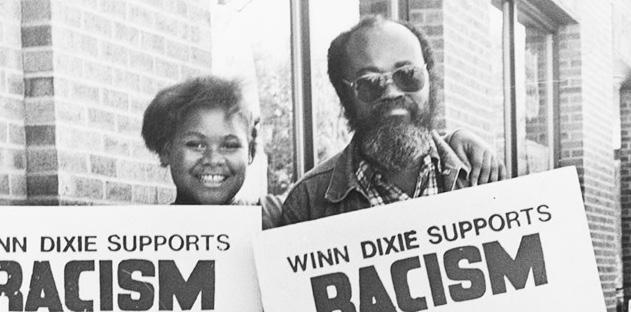
Degree in Divinity from the Interdenominational Theological Center in Atlanta in 1969.
That same year he took a position at the SCLC, with plans to remain for only two years. His childhood pastor in Alabama, Rev. Ralph David Abernathy, headed the organization when Rev. Taylor joined its professional staff.
“It was never my goal to be in leadership,” Rev. Taylor, a resplendent rose in the Civil Rights garden, once said. “ It was my sole objective to serve others, to support and encourage them. I was not interested in making a personal fortune. Being part of substantive social change for all people enriched me greatly.”
An associate pastor at
Trinity Baptist Church in Decatur, Ga., Rev. Taylor spoke at churches and rallies throughout the nation. He was one of the final living connections to the likes of Dr. Martin Luther King Jr., Rosa Parks and Congressman John Lewis, all civilrights legends.In addition to his daughter, Vonya, Rev. Taylor’s survivors include five grandchildren, two great-grandchildren, his former wife, Carolyn Yvonne McDaniel, his uncle, Isaac Bates, his 96-year-old aunt, Lillian Bates, his Trinity Baptist Church family and his Southern Christian Leadership Conference family.

By Jennifer Porter Gore Word In Black
The nation’s top doctor declared June 25 that the skyrocketing number of deaths and injuries due to firearms has made gun violence an American public health crisis that needs urgent attention.
In a first-of-its-kind advisory, Surgeon General Vivek Murthy sounded the alarm about this significant public health challenge “…that require[s] the nation’s immediate awareness and action,” the advisory says.
“It is now time for us to take this issue out of the realm of politics and put it in the realm of public health, the way we did with smoking more than a half century ago,” Murthy told the Associated Press.
But a crisis for America in general is a fullblown catastrophe in Black communities.
Despite making up roughly 14 percent of the U.S. population, data shows Black people accounted for 60 percent of firearm deaths each year between 2017 and 2021. Black people were 11.5 times more likely to be victims of firearm homicide than their White peers, and gunfire has been the leading killer of Black children since 2009.
In 2022, more than 48,000 people in the U.S. — 132 people every single day — died because of a firearm, according to the CDC. More than half of these deaths were suicides and around 4 in 10 were homicides. These numbers put firearm injuries in the top 5 categories for causes of death for people under age 45.
Murthy’s public declaration is the first time gun violence has been identified as a national crisis. It goes further than the Centers for Disease Control and Prevention, which has identified gun homicides as an important public health issue.
Murthy’s 40-page declaration outlined
several major health threats connected to firearms, including racial and gender disparities in firearm-related deaths along with the impact gun violence has on families, children and communities.
A recent national survey found that “the majority of U.S. adults or their family members (54 percent) have experienced a firearm-related incident,” according to the advisory’s introduction. That includes “21
“It is now time for us to take this issue out of the realm of politics and put it in the realm of public health, the way we did with smoking more than a half century ago.”
percent who have personally been threatened with a firearm, 19 percent have a family member who was killed by a firearm (including by suicide), 17 percent have witnessed someone being shot, 4 percent have shot a firearm in self-defense and 4 percent have been injured by a firearm.”
“Such high levels of exposure to firearm violence for both children and adults give rise to a cycle of trauma and fear within our communities, contributing to the nation’s mental health crisis,” according to the advisory.
The advisory recommends several steps to confront the crisis, such as implementing community violence reduction programs, requiring safe storage of firearms, having


among Black youth was significantly higher than any other racial and ethnic group and six times higher than White youth.
Between 2018 and 2022, the rate of firearm deaths doubled among Black youth.
While gun control advocates hailed Murthy’s advisory, they believe he could have gone further. They want a full-fledged surgeon general’s report on guns similar to the one issued on cigarette smoking in 1964. That report, directly linking smoking to cancer, was a major catalyst in reversing smoking rates in the U.S. That report led to requiring tobacco companies to print warning label on cigarette packages, and was key to groundbreaking lawsuits against the tobacco industry.
“Surgeon General reports are renowned publications that take an evidence-based approach to our nation’s most urgent public health issues,” said Dr. Joseph V Sakran, Board Chair and Chief Medical Officer at Brady United, a gun safety nonprofit. “Seeing as firearms are now the leading cause of death for children and teens in the U.S., there’s arguably no public health issue that’s more urgent or that warrants the commission of a Surgeon General report more than gun violence.”
universal background checks for all firearm purchases, and protection orders in cases of domestic violence and threats of self-harm— also called “red flag” laws.
Since 2020, firearms have been the number one cause of death among children and teens in the U.S. Firearm injuries, including homicides, suicides, and unintentional injuries, were the leading cause of death among children and teens ages 1 to 19 in 2020 and 2021.
Among Black and Hispanic children and adolescents, deaths by gunshot have increased sharply since the COVID pandemic began in 2020. In 2022, the rate of firearm deaths
Historically, “we have seen how the release of Surgeon General reports on public health issues such as the dangers of smoking ignited a wave of policy, legal and public health initiatives that saved countless American lives and, in this case, led to deprogramming our nation from the tobacco industry’s lies,” Sakran said. “We hope this report will have the same resounding impact on the gun violence epidemic.”
This article was originally published by Word In Black.
FDA delays: Why menthols and hair relaxers aren’t banned yet
By Jennifer Porter Gore Word In Black
During the past two years, the federal Food and Drug Administration pledged it would protect consumers from two harmful chemical ingredients in products that are used by millions of Americans — particularly Black Americans — every day.
But the regulatory agency’s steps toward banning formaldehyde in hair relaxers and menthol as an ingredient in cigars and cigarettes looks more like a cha-cha slide than a race to improve Black health.
For decades, as study after study linked both of those chemicals to poor health outcomes for Black consumers — including potentially deadly diseases — the agency did little to get them off the market.
In fact, the FDA has missed its own deadlines for proposed bans on menthol-flavored cigarettes and formaldehyde in hair-smoothing products.
As a result, Black women with straightened or relaxed hair remained at heightened risk for developing cancer or other health problems at the hair salon. And Black smokers, who overwhelmingly prefer menthol in their tobacco products, are more likely to develop smoking-related diseases, including heart disease, lung cancer or stroke — and face a much tougher struggle if they want to quit.
Last year, Democratic Reps. Ayanna Pressley of Massachusetts and Shontel Brown of Ohio, who are both Black women, sent a joint letter to the FDA commissioner urging more regulation over hair relaxers marketed toward Black women.
“As a result of antiBlack hair sentiment, Black

women have been unfairly subjected to scrutiny and forced to navigate the extreme politicization of hair,” Brown and Pressley wrote. “Hence, generations of Black women have adapted by straightening hair in an attempt to achieve social and economic advancement.”
Last year, the FDA announced that after decades of research showing the dangers of formaldehyde in hair care products it would move to prevent the chemical’s use in traditional hair relaxers and keratin-based products.
A known carcinogen, formaldehyde is a common ingredient in “no-lye” relaxers and similar products, such as “Brazilian blowouts” and other keratin treatments. But the chemical, which produces fumes in salon products, is a health hazard if inhaled and can cause damage to eyes or skin with direct contact, according to the FDA.
In 2021 and 2022, research from Boston University’s Black Women’s Health Study showed an increased risk of hormone-related cancers, including breast and uterine cancer, among women with
long-term use of chemical relaxers. As part of the study, almost 45,000 women with an intact uterus who selfidentified as Black were followed from 1997, when participants were first asked about chemical hair relaxer use, until 2019.
A vast number of Black women have been, or continue to be, exposed to this risk: researchers found that up to 95 percent of participants in the Black Women’s Health Study reported having used hair relaxers at some point in their lifetime.
The FDA began investigating the issue in 2011, when the nonprofit Environmental Working Group petitioned the agency to ban formaldehyde in hair straighteners and require manufacturers to add warning labels on product packaging. The same year, the agency issued warning letters to manufacturers of keratinlabeled hair-smoothing products containing formaldehyde, citing violations of federal safety standards.
Maryland Legal Aid sues
Baltimore City for ‘unconstitutional’ tax sale
By Megan Sayles AFRO Business Writer msayles@afro.com
Maryland Legal Aid, which specializes in providing law services to impoverished families, filed a lawsuit against the city of Baltimore on July 2, asserting that its tax sale process is unconstitutional and deprives residents of the generational equity they are due.
The suit was filed on behalf of the Edmondson Community Organization (ECO), which lost its West Baltimore property in 2018 through the annual auction.
Maryland Legal Aid and ECO claim the building was
“It’s time to build a new tax sale model—one based on extreme empathy for low-income, marginalized residents facing hardship...”
seized and sold without just compensation.
The litigation trails a 2023 unanimous decision from the U.S. Supreme Court that prohibits the government from retaining more than the initial tax debt amount after taking and selling a person’s property.
“I stand with the people who live in the homes in this community. They raise their family in these homes, they have cookouts in these homes and they build wealth
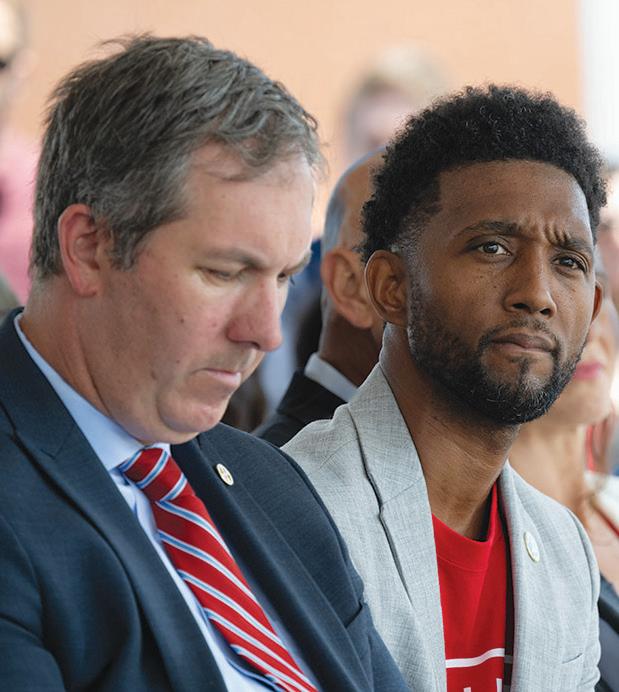

Baltimore City Council to hold hearings on opioid crisis
By Tashi McQueen AFRO Political Writer tmcqueen@afro.com
Baltimore City Councilwoman Danielle McCray (D-District 2), chairwoman of the Health, Environment and Technology Committee and Baltimore City Councilman Mark Conway (D-District 4) have announced upcoming legislative hearings on the opioid crisis.
Conway said the initial meeting is aimed at getting an understanding of the opioid problem, talk about the data and get a better understanding of what the
By Tashi McQueen AFRO Political Writer tmcqueen@afro.com
Gov. Wes Moore (D) and Baltimore City Mayor
Brandon M. Scott (D) gathered at the Johns Hopkins Bayview Medical Center, an expected stop for the Red Line, to announce that the transit line will be a light rail instead of a rapid bus system on June 28.
“Over two decades ago, leaders from around the city and around the state got together and first started working on the first iteration of the Red Line project,” said Moore to the crowd gathered in support of the project.
“The work began with an understanding that you cannot have economic mobility if you do not have physical mobility.”
According to the Baltimore City Department of Transportation, because the line is being built as a light rail, it will operate similar to a subway, providing swift and reliable transit.
“We are one step closer to a time when our patients and their loved ones will find it easier to get to their appointments,” said Kevin Sowers, president of the Johns Hopkins Health System. “We are one step closer to ensuring that our staff members have safe, reliable means to get to and from our campuses each and every day.”
“Over two decades ago, leaders from around the city and around the state got together and first started working on the first iteration of the Red Line project. The work began with an understanding that you cannot have economic mobility if you do not have physical mobility.”
Moore did his best to reassure those who are skeptical about completion of the Red Line, an east-west Baltimore transit line proposed, but then axed in 2015 by former Governor Larry Hogan’s administration.
“I understand the frustration that a lot of you might feel. It’s difficult to have hope if you feel like hope is going to be dashed,” said Moore. “The promise of today, the promise of this team and the commitment that we’re making is that everyday we’re going to make sure that we’re fulfilling this promise.”
Moore said the state is going to continue working with the community, federal and local partners throughout the process and echoed that the Red Line is a priority for his administration.
By Ericka Alston Buck Special to the AFRO
Baltimore will once again burst into life in July as it hosts the iconic Baltimore Washington One Carnival, marking its monumental 43rd anniversary. For over four decades, this vibrant celebration has been a cornerstone of the city’s cultural calendar, bringing together people from all walks of life to revel in the rich tapestry of Caribbean heritage. Since its inception, Baltimore’s One Carnival has grown from humble beginnings into a spectacular showcase of Caribbean culture, attracting thousands of
The 14-mile transit route will connect Baltimoreans from Woodlawn in Baltimore County, Md. to the Johns Hopkins Bayview Medical Center.
“The next, largest phase is the alignment study. That means where you are physically going to put the alignment of the light rail,” Paul Wiedefeld, secretary of the Maryland Department of Transportation (MDOT). “What we’re going to do now is work with the community on that, do some environmental documentation to support that and hopefully by the end of the year, we’ll be able to say that’s the alignment.”
Wiedefeld said the completed rail alignment plans will allow MDOT to move forward with seeking federal funding. He said the mode of transportation and alignment must be determined to compete against other cities for the funds.
“The upcoming hearings are part of this ongoing effort to ensure all stakeholders are involved and informed.”
next steps may be.
“My hope is that everyone can be on the same page about what is happening today so we can all figure out what we should do moving forward,” said Conway.
Conway’s initial hearing is set for July 10 at 1 p.m. with the Public Safety and Government Operations Committee.
McCray’s three hearings, set for July 24, August 28 and Sept. 25, will continue her committee’s efforts to create a coordinated city government approach in addressing Baltimore City’s overdose crisis.
“As a lifelong
visitors each year. Under the dedicated stewardship of Elaine Simon, president of the Caribbean American Carnival Association of Baltimore, the carnival has evolved into a beloved tradition, providing a nexus for family gatherings and serving as the focal point of interest for residents and visitors to Baltimore City. With the advance publicity afforded to the Carnival by print and electronic media, the Mayor’s Office of Communication and #VisitBaltimore, Baltimore Washington One Caribbean Carnival’s growth and development is exponential. In 2023, attendance was well over 25,000 spectators. As the countdown

The 43rd Baltimore Washington One Carnival will take place July 12-14, drawing thousands of
City.
to the 43rd anniversary celebration begins, excitement is reaching fever pitch throughout the city. Plans are underway for a truly spectacular event, with organizers promising
to
an unforgettable experience that will pay homage to the carnival’s illustrious history while embracing the spirit of renewal and innovation. The highlight of the anniversary celebration
will undoubtedly be the grand parade, a dazzling procession of floats, dancers and musicians that will wind its way through the streets of Baltimore.
every step. But the carnival is more than just a parade—it’s a testament to the power of community and cultural pride. Over the past four decades, the carnival has served as a platform for showcasing the diverse talents and traditions of the Caribbean diaspora,
Adorned in elaborate costumes that reflect the vibrant colors and intricate designs of the Caribbean, participants will showcase their artistry and creativity, mesmerizing onlookers with Continued on B2

Continued from B1
in these homes that they pass down to their children and grandchildren,” said Somil Trivedi, chief legal and advocacy director for Maryland Legal Aid. “It’s these homes that are the subject of this lawsuit because the government is selling them out from under you for pennies on the dollar.”
“Worse yet, the city is actively depressing the equity in those homes, robbing your families and communities of the vital generational wealth that is required to keep this community running,” he continued.
When an individual fails to pay their property taxes, the government can place a tax lien on the home. Each year, the city of Baltimore sells these tax liens in a public, online auction to outside bidders, ultimately awarding them to the
highest bidder. The former property owner is entitled to receive compensation equal to the difference between the amount of the tax lien and winning bid.
ECO and Maryland Legal Aid argue that the city’s process is unlawful for several reasons: it charges a high-bid premium that discourages bidders from making fair bids, it does not impose a minimum bid other than the amount of the lien and it does not adequately advertise the properties for sale, which hinders competition.
They believe these factors have led to homes being sold for a fraction of their true market value.
“Yes, people have to pay their taxes— of course they do,” said Jonathan Sacks, executive director of ECO’s development division. “But, it’s about a super complex system that
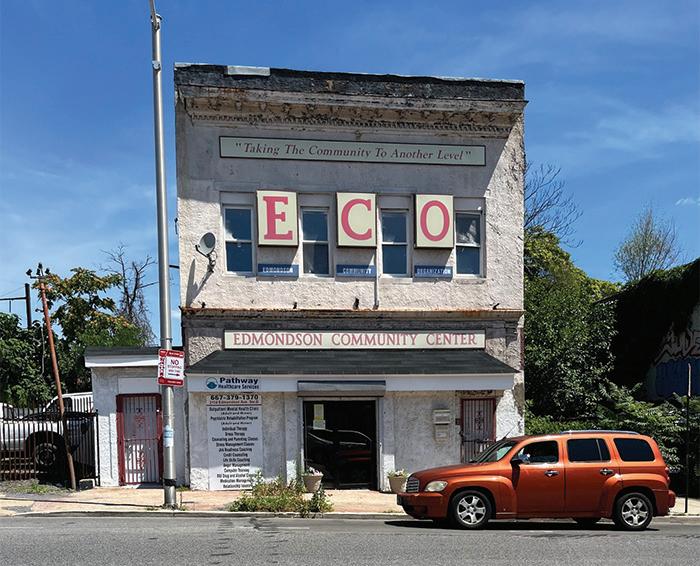
Continued from B1 affected by the opioid epidemic and using the resources effectively to combat the crisis.”
Baltimorean, I have long recognized the severity of the overdose crisis in Baltimore. That’s why in 2021, I proactively introduced 21-0071R - Investigative HearingDeveloping a Coordinated Response to Baltimore City’s Overdose Crisis. I remain committed to collaboration and transparency in addressing this critical issue,” said McCray, in a statement sent to the AFRO. “The upcoming hearings are part of this ongoing effort to ensure all stakeholders are involved and informed.
I also commend our city solicitor and legal team for achieving a historic $45 million settlement with Allergan Finance.
This monumental victory is a testament to our unwavering commitment to seeking justice for those
The committee held recurring hearings in 2022 and 2023.
Conway said members of the public will not be able to testify at his meeting due to the sensitive nature of the ongoing lawsuits against Johnson and Johnson, McKesson, Cardinal Health, AmerisourceBergen, Walgreens, CVS, Teva Pharmaceuticals and former Insys Therapeutics CEO John Kapoor.
Baltimore City Mayor Brandon M. Scott (D) announced on June 10 that the city had reached a $45 million settlement with Allergan Finance, an opioid manufacturer.
“We are fully aware of the devastating toll that the actions of these defendants
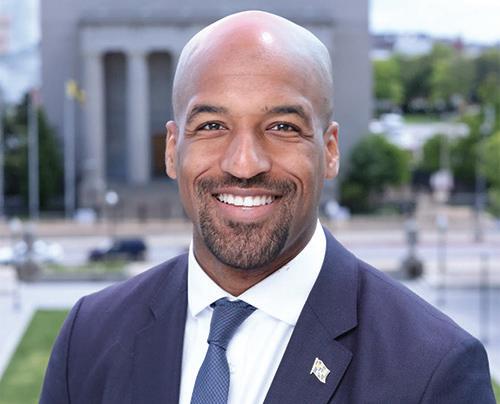
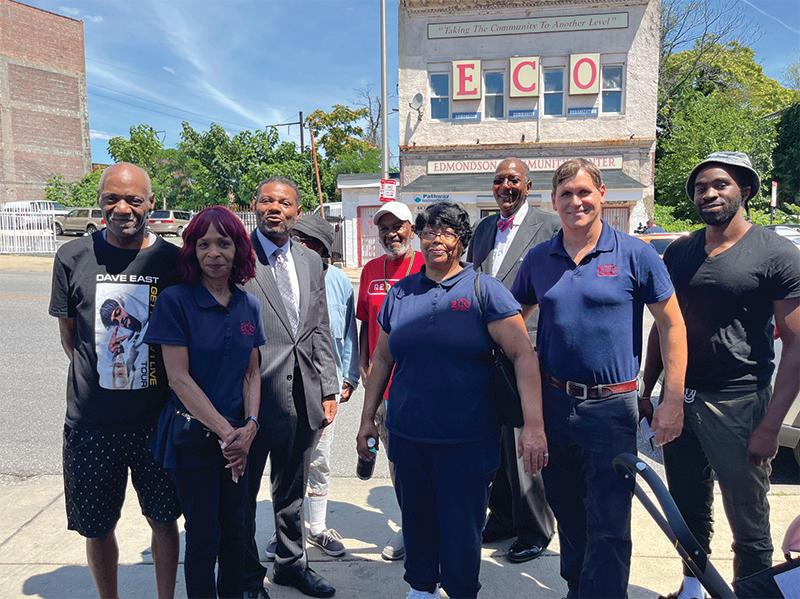
is perfectly constructed for sophisticated, largescale investors to steal the generational equity of lowincome and, often, AfricanAmerican families and leaving a housing detritus across Baltimore in the wake of those actions.”
According to the complaint, ECO owed $2,543 in taxes when its headquarters became part of the city’s tax sale in 2018.
California-based investor Tempest, purchased the nonprofit’s lien for $5,115.
After foreclosing on ECO’s right of redemption in 2019, Tempest sold the property for $139,500 during a public auction in 2022.
Prior to the sale, ECO president Joe Richardson raised $65,000 to buy back the property from Tempest, but the company refused the offer, according to the
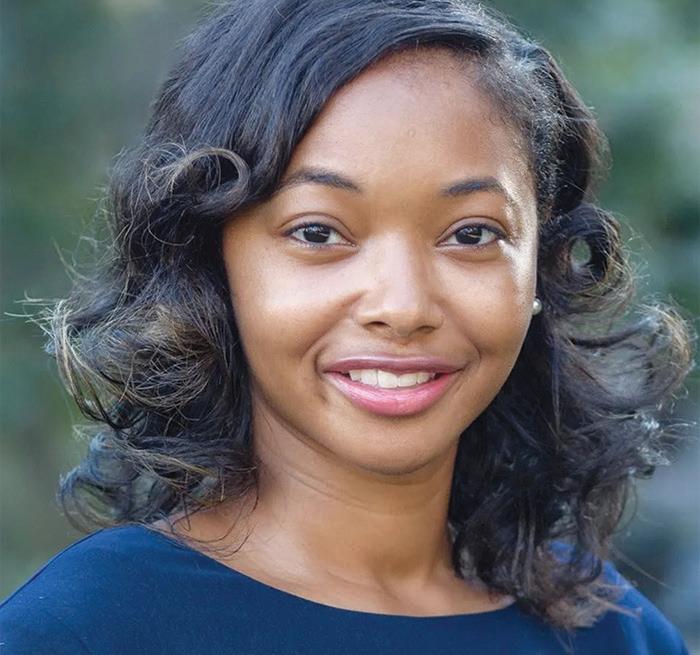
Committee Danielle McCray (D-District 2) will lead three hearings on the city’s opioid crisis.
have taken on our city and we have shown our commitment to ensuring that they pay their fair share to tackle the harms they have left in the wake of their greed,” said Scott in a statement. “We are committed to ensuring that every penny of this and any other amount recovered is put to its most effective and best use to combat the opioid epidemic in Baltimore City at all levels.”
According to the release, Baltimore received a larger settlement than the state of Maryland, which settled on $38 million earlier this year. The entire $45 million must be paid in 30 days.
“While that settlement does not bring back the people we lost, it is an
important statement of our city’s values,” said Baltimore City Councilman Zeke Cohen (D-District 1) during a city council meeting on June 10.
“I’m grateful for Ebony Thomspon and the Scott administration for holding this company and others accountable for the harm that was done.”
The release assures that the current administration will do everything they can to address the opioid crisis in Baltimore and use the funds they get from litigation to decrease the impact of the issue.
To attend both hearings, those interested can go to the fourth floor of the Baltimore City Hall or watch online via Charm TV.
complaint. ECO received just $2,571 from the city, the balance of the tax sale.
“To the city, we say your tax sale is not a property sale,” Sacks added. “Yet, in many cases, it’s acting like one unfairly by giving away to speculators—through the backdoor— the homes, community centers and businesses of Baltimore residents, while giving nothing or next to nothing back in compensation to those owners.”
ECO was established in 1993 to serve the MidtownEdmondson neighborhood, a primarily Black and long disinvested community. It opened its Edmondson Avenue community center in 1995.
Sacks said ECO’s building was the last community asset in the neighborhood, as it does
not have a school, city-run facility, library or police station. ECO is seeking monetary damages from the city and asking a U.S. District Court to require Baltimore to end its practices.
“Your extractive, tangled title-creating, longterm vacancy-spreading, community-destroying tax sale is going to be over with this case,” said Sacks. “It’s time to build a new tax sale model—one based on extreme empathy for low-income, marginalized residents facing hardship, one with policies that value properties for what they are actually worth when a taking is absolutely necessary and one that returns the excess equity after taxes are paid back to the original owners, not to the speculators.”
Continued from B1
fostering a sense of belonging and unity among participants and spectators alike.
As the sun sets on each day of the anniversary celebration, the festivities will continue into the night, with live performances, concerts and parties filling the air with music and merriment. From the infectious rhythms of reggae to the pulsating beats of soca, the sounds of the Caribbean will provide the soundtrack for an unforgettable celebration.
And for those seeking a taste of the islands, a tantalizing array of food vendors will offer up authentic Caribbean cuisine, from spicy jerk chicken to refreshing coconut water. With every bite, attendees will savor the flavors of the Caribbean, transported momentarily to a tropical paradise far from the bustling streets of Baltimore.
The 43rd annual Baltimore Washington One Carnival is set to take place
over the weekend of July 12-14 at the Historic Druid Hill Park, located at 900 Druid Park Lake Drive, Baltimore. The three-day event opens on Friday, July 12, from 2-10 p.m. with a day party. The parade will be held on the Saturday, commencing at 12 noon at the intersection of Park Circle and Reisterstown Road, with the festivities continuing at Druid Hill Park with food, crafts, and live entertainment until 10 p.m. On Sunday, July 14, the celebration culminates, from 12 noon to 9 p.m., in a day of family-friendly activities, including games, arts and crafts and cultural performances. It’s a chance for people of all ages to come together and celebrate the carnival’s rich history and enduring legacy, creating memories that will last a lifetime. Make sure to mark your calendars and join the festivities in celebrating the vibrant spirit of the Caribbean right in the heart of Baltimore.
By Aleisha Robinson AFRO Intern arobinson@afro.com
In the midst of COVID-19 pandemic, in August 2020, Jeanette Wooten and Corin ‘Tiny’ Adams co- founded Leader Breeders, a non-profit organization dedicated to transforming the lives of Baltimore youths.
This non-profit organization is dedicated to academic enrichment, career development, physical therapy and community engagement. The group is led by an allfemale executive board, and is making significant strides to transform the lives of children and young adults in Charm City.
“I’ve always been involved in youth work in Baltimore, but during the pandemic, I came across a few squeegee boys and young people who needed guidance and mentorship,” said Adams. “I incorporated Leader Breeders in 2020 to make an impact on youth development and create a space for kids to come in and get quality reinforcements and empowerment.”

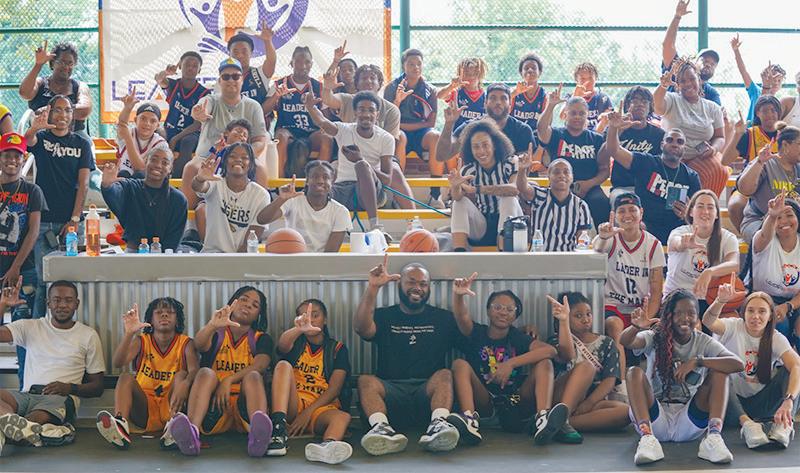
where she learned important life lessons and built a strong community. She landed in Baltimore after securing a scholarship at Morgan State University in 2006 to play basketball.
“In a place like Baltimore, where kids have to grow up fast, be mature and worry about things that are well beyond their years, it’s heartwarming to see them coming together and be excited.”
Originally from Brooklyn, New York, Adams chose to establish Leader Breeders in Baltimore because she felt a deeper connection to the city
“Rather than going back to New York, where I felt I would have had to start over, I decided that Baltimore was where I still had a lot of my
connections and a network of people that would help me,” said Adams.
The organization has programs designed to empower the youths, build leadership skills and create a positive impact with the Baltimore community. This includes mentorship programs from college students, academic enrichment programs that offer tutoring, career development, community enhancement and physical activities.
Desiree Lassiter, a 44-year-old lawyer from Baltimore whose daughter Isabella Lassiter participates in Leader Breeders’ activities, said since joining the organization her child’s confidence and social skills have soared, transforming her
into a more self-assured and community-minded individual.
“One of the reasons my husband and I put her in there was that she was struggling with confidence in basketball. Since participating in Leader Breeders, I can honestly say, I’ve seen about a 200 to 300 percent improvement,” said Lassiter. “She has developed commitment to her community and to her peers. She has this desire to help people feel comfortable, become a leader and engage with other kids in the program.”
Isabella Lassiter, who joined the program when she was 10-years-old and is now 11, said she cherishes her experiences with Leader Breeders. She finds motivation in the mentorship program at Morgan State University
Basketball, and said the organization has helped her both on and off of the court.
“I learned etiquette,” said Isabella. “That will help me in the future when I go to fancy places…I know how to be respectful because they taught me that.”
Leader Breeders has now also launched a new certification program, offering self-guided courses in finance, Microsoft Office and Graphic design. Alongside this initiative, their after-school programs at locations like the Rita Church Community Center integrate essential life skills such as financial literacy and resume writing. Recognizing a growing interest in non-collegiate career paths, program leadership is working on a plan to expand the
certification program to local rec centers and high schools with a goal of equipping youth with practical skills and certifications for future employment opportunities.
Desiree Lassiter advises parents to sign up their child “immediately” because of the impact Leader Breeders provides to young boys and girls.
“The impact is tremendous… when you walk into the room they are all smiling, laughing and playing together, which is beautiful to see,” said Desiree Lassiter. “In a place like Baltimore, where kids have to grow up fast, be mature and worry about things that are well beyond their years, it’s heartwarming to see them coming together and be excited.”




By Mekhi Abbott AFRO Sports Intern mabbott@afro.com
The BIG3 league, an innovative and unique three-on-three professional basketball league founded by rapper and actor O’Shea “Ice Cube” Jackson Sr., is now in its seventh season. The BIG3 uses a “tour” model, unlike many typical professional basketball leagues. For 10 weekends from June 18 to Aug. 7, the BIG3 will be playing in cities such as Oakland, Calif., Newark, N.J. and Nashville, Tenn.
On June 29, the BIG3 took a trip to Baltimore and played at CFG Bank Arena. Fans came out to watch multiple former National Basketball Association champions such as Jeff Teague and Corey Brewer. The game included celebrity coaches such as the legendary Julius “Dr. J” Erving, Nancy Leiberman and Lisa Leslie, who is a three-time Women’s National Basketball Association Most Valuable Player and a winning coach in the BIG3’s 2019 season championship games.

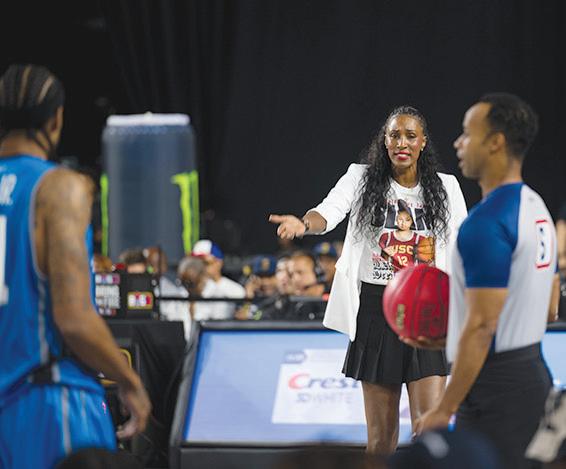


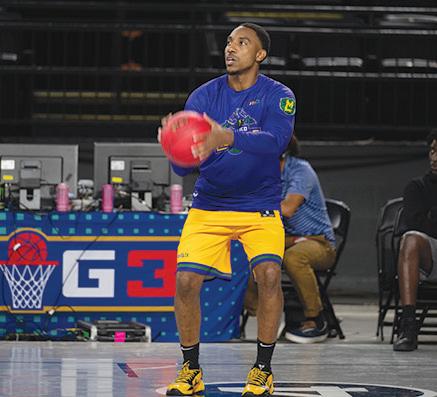


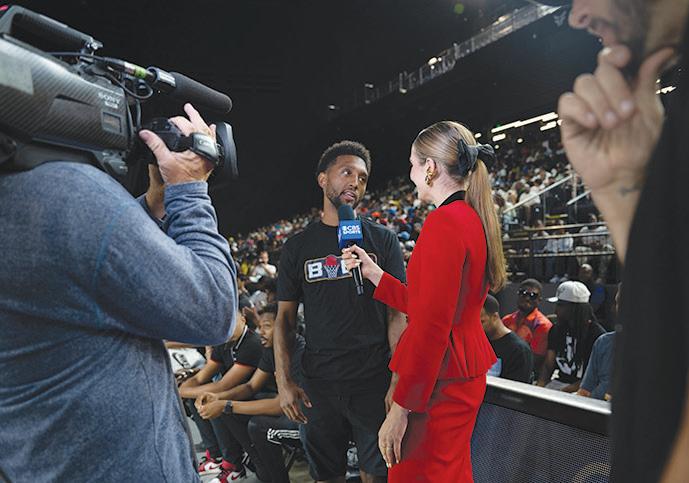

By Mackenzie Williams AFRO Intern Mwilliams@afro.com
On May 18, Alasia Franklin, a 21-yearold collegiate scholar was shot and killed on the campus of Kennesaw State University by 21-year-old Samuel Harris.
Kennesaw State Emergency Management issued an alert via X (Twitter), informing the campus community of an armed intruder. Students were instructed to take cover. Thirtysix minutes later the “all clear” was given and a tragedy was confirmed: a student had been shot and killed by an intruder who was not
“Seventy percent of those who experienced abuse did not know at the time that they were in an abusive relationship,” according to the organization. “Fifty-seven percent surveyed reported that it was very difficult or somewhat difficult to identify dating abuse.”
Karimah Dillard, director of policy for the Georgia Coalition Against Domestic Violence, said there are parallels between microaggressions seen in instances of gender based violence and those experienced along with racism.
“In the same way we talk about microaggressions and race, we have to look at those same sorts of microaggressions and gender based violence. It’s not the punch, it’s not the slap– it’s not the kick that happens first.”
“Domestic violence has to be as unacceptable as it is to smoke in front of a baby.”
enrolled at the institution. The threat to campus was gone– but so was the bright light known to all as Alasia Franklin.
Alasia Franklin’s murder is a reminder of how far we have to go in our efforts to prevent relationship violence and help support healthy relationships,” said Lisae C. Jordan, Esq. executive director and counsel for Maryland Coalition Against Sexual Assault told the AFRO. “This senseless loss of life is far too common. We need to empower young people with the ability to recognize dangerous behavior and have the skills to create respectful relationships.”
According to Network for Victim Recovery of D.C. (NVRDC), most college students aren’t aware they are being abused until something physical or violent happens.
Dillard, a survivor of domestic violence, now challenges Black women to express their concerns about emotional and verbal abuse as soon as they see them.
According to the National Coalition Against Domestic Violence, “45.1 percent of Black women have experienced intimate partner physical violence, intimate partner sexual violence and/or intimate partner stalking in their lifetimes.” In addition, “an estimated 51.3 percent of Black adult female homicides are related to intimate partner violence.”
“Domestic violence has to be as unacceptable as it is to smoke in front of a baby,” said Dillard.
In the months and weeks after Franklin’s killing, fellow students have worked to make sure her death was not in vain.

and closing the physical campus off to the surrounding community.
“It’s obviously going to be really expensive to cut off all of campus, but at least if we can have the students protected that live on campus, that is the most valuable option,” he said.
In addition to suggestions for the school can handle domestic violence situations, Harrison also spoke with the AFRO about how friends and family can help those in need. He said he regrets not being able to notice the signs of Franklin’s situation himself. In the past month, he has learned that others noticed Franklin was refraining from attending school events and seemed “off’ closer to the date of her death.
“I think knowing boundaries is a thing,” Harrison said, when asked how Black men can create awareness regarding intimate partner violence. “We’ve got to learn how to use our head[s]. I think that’s something that’s not really taught in the Black community–especially for young men.”
know they are in an abusive relationship until physical domestic violence begins.
Anthony Harrison, a senior and former vice president of the student government association at Kennesaw State, took immediate action to hold his school accountable. He was the friend who discovered Franklin bleeding to death in front of his building just weeks ago.
Harrison drew up a safety plan and spoke with the president of the university regarding safety measures that can be implemented at the university, such as scanned entrances
Harrison said Black men need to understand that choosing to “just get angry” and “lash out” can lead to “decisions that you’ll end up regretting for the rest of your life.”
According to authorities, Samuel Harris was found in Franklin’s car in another jurisdiction. He was arrested in Cobb County and charged with murder, aggravated assault and possession of a firearm during the commission of a crime.
If you or anyone you know may be experiencing domestic abuse, please contact The National Domestic Violence Hotline at 800-799-7233 or text BEGIN to 88788 or if you are on a college campus please contact you nearent Title IX office or violence prevention office via your campus directory.
By Joseph Williams Word In Black
If, as the saying goes, you shouldn’t let a crisis go to waste, then the federal government did just that when it passed the first round of multiple-billion-dollar payments to help shut-down schools reopen safely when the pandemic subsided.
Besides air purifiers and rapid tests, however, some cash-strapped districts used the windfall to pay for badly-needed investments: building renovations, teacher pay raises, tutoring for struggling students, after-school programs, in-school therapists. For Black school children, the upgrades not only addressed pandemic learning loss but helped slightly narrow the Black-White achievement gap.
After three rounds of allocations, however, funds from the Elementary and Secondary School Emergency Relief Act will expire in September, and no future payments are on the horizon. That’s bad news for Black students, who gained amenities their White peers in better-funded districts take for granted.
“We’ve had these opportunities that have been created through the ESSER dollars,” says Jen Rinehart, senior vice president for strategies and programs for Afterschool Alliance, a nonprofit advocacy group. “With the deadline for the spending coming up, we’re concerned that many of those young people will lose out on programs that they and their families have really begun to rely on.”
A February report from the nonprofit Center for Budget Policy Priorities put a finer point on it.
After three rounds of spending, the end of ESSER “will create a fiscal cliff for school districts, which will need to figure out how to make up for the lost dollars or significantly reduce services,” according to the report.
“In states that reported data, nearly 50 percent of ESSER III funds
have gone to labor costs,” the report states. “Those newly hired staff are now at risk of being laid off if states don’t increase funding from other sources.”
Reinhart says those layoffs will hurt students of color — a cruel irony since the pandemic “exacerbated many of the disparities that we saw, pre-COVID” between schools and districts that are well-funded and those that are barely getting by.
“Now,” she says, “we run the risk of returning to a situation where we’re going to exacerbate, yet again, some of those disparities.
Congress seemed to have school funding disparities in mind when it passed the first round of ESSER findings in 2020. The bill was structured in part to ensure highpoverty districts got their share of the massive aid bill — arguably the largest school spending package in U.S. history.
Between March 2020 and March
2021, Congress passed three rounds of funding for schools, totaling some $190 billion. Although districts had wide latitude in spending it, the money came with a catch: all funds that weren’t already spent or designated for a project by Sept. 30, 2024, would go back to the federal treasury, with few exceptions.
Perhaps not surprisingly, the impact of what experts are calling “the ESSER fiscal cliff” will fall hardest on low-income districts, which tend to be majority-Black and Latino districts.
“High-poverty communities will see sharper impacts to their school budgets in part because of how ESSER funding was structured: At the outset, ESSER funds were intended to provide greater levels of support for high-need schools,” according to a report from the Brookings Institute, a Washington, D.C. policy center. However, “as ESSER ends, those same districts
now have more dollars to cut from their recent annual budgets.”
That’s because, for a variety of reasons, those districts have spent the money more slowly than higher-income districts, according to the report. The slower pace, the report states, has had the unintended consequence of leaving a district “with even more money in its 202324 budget, resulting in a larger yearto-year contraction as the cliff hits in fall of 2024.”
Since the lion’s share of a school district’s budget goes to staff, those schools will probably have to cut the counselors, tutors and other hires that could help them not only reverse pandemic learning loss but close the achievement gap with White students, according to the report. Those staffing cuts “can wind up hurting both educators and students of color the most,” with some districts already enacting hiring freezes and layoffs, according to
the Brookings report. “If history is any guide, with these types of staff reductions, the most vulnerable students experience the most disruption.”
Reinhart of the Afterschool Alliance says it’s unclear what comes next after ESSER funds run out, but she hopes lawmakers on Capitol Hill — particularly those with children — can connect the dots between what they and their kids experienced during lockdown and how valuable extra programs can be for students of color.
“If you talk to lawmakers who have children themselves, or even school-aged grandchildren, they recognize the value of the programs that their kids and grandkids are participating in,” she says. “I think what gets lost too often is how big the disparities are.”
This article was originally published by Word In Black.
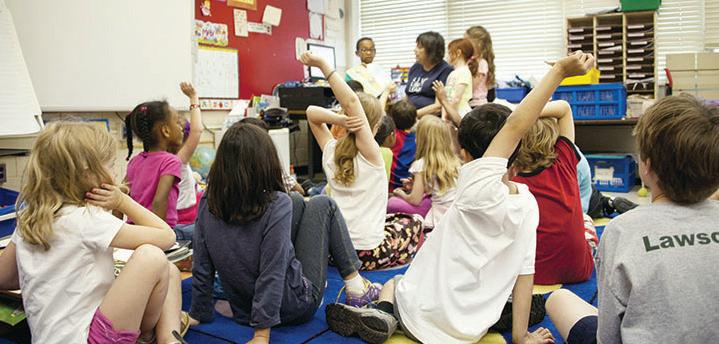

By Wayne Campbell
A recent study by researchers from World Health Organization (WHO), together with academic colleagues and published in The Lancet Global Health journal, found that nearly one third (31 percent) of the world’s adult population, 1.8 billion adults, are physically inactive. That is, they do not meet the global recommendations of at least 150 minutes of moderate-intensity physical activity per week. Alarmingly, this is an increase of 5 percentage points between 2010 and 2022.
The WHO says if this trend continues, the proportion of adults not meeting recommended levels of physical activity is projected to rise to 35 percent by 2030. Shockingly, the global estimate of the cost of physical inactivity to public health care systems between 2020 and 2030 is about US$ 300 billion (approximately US$ 27 billion per year) if levels of physical inactivity are not reduced.
WHO officials define physical activity as any bodily movement produced by skeletal muscles that requires energy expenditure. Physical activity refers to all movement including during leisure time, for transport to get to and from places, or as part of a person’s work or domestic activities. Research indicates that both moderate- and vigorousintensity physical activity improve health. Popular ways to be active include walking, cycling, wheeling, sports, active recreation and play, and can be done at any level of skill and for enjoyment by everybody.
Physical activity is beneficial to health and well-being and conversely, physical inactivity increases risk for noncommunicable diseases (NCDs) and other poor health outcomes. Together, physical inactivity and sedentary behaviors are contributing to the rise in NCDs and placing a burden on healthcare systems. WHO states that improving levels of physical activity will benefit health and well-being and contribute to attainment of global NCD targets and a number of the Sustainable Development Goals. However, this will require increased commitments and investments by member states; innovation and contributions from nonstate actors; cross sector coordination and collaboration and ongoing guidance and monitoring from the World Health Organization.
Benefits of physical activity
Mental health and physical health are closely connected. Although not a cure-all, increasing physical activity directly contributes to improved mental health and better overall health and well-being. Exercise causes your brain to release ‘feel good’ chemicals like endorphins and serotonin that help improve your mood. Physical inactivity is one of the leading risk factors for non-communicable diseases mortality.
People who are insufficiently active have a 20 percent to 30 percent increased risk of death compared to people who are sufficiently active. Sedentary behavior is any period of low-energy expenditure while awake such as sitting, reclining or lying. Lives are becoming increasingly sedentary through the use of motorized transport and the increased use of screens for work, education and recreation. There is also a generational impact of physical inactivity.
Parents who are physically inactive are likely to nurture their children in a similar manner. It is therefore imperative that parents realize that they do not only have a responsibility
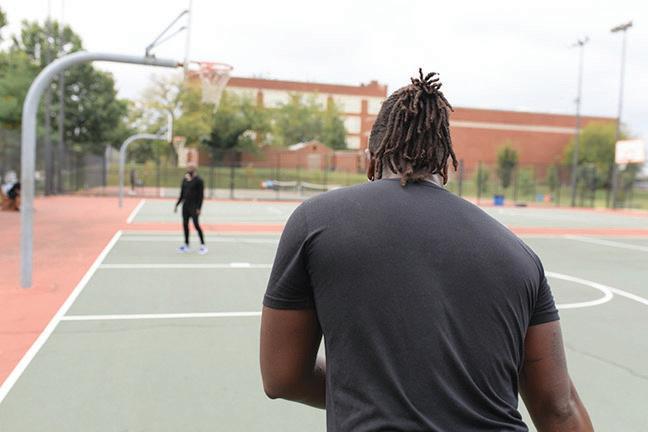
week, as suggested by experts.
for themselves but also for the future generations. It is also important that physical education, commonly called P.E., be taken more seriously in our schools. Too many of our children are overweight or are obese as the emphasis of our education system turns to science, technology, engineering and mathematics (STEM). Evidence shows higher amounts of sedentary behavior are associated with the following poor health outcomes in children and adolescents: increased adiposity, poorer cardiometabolic health, fitness, behavioral conduct/prosocial behavior and reduced sleep duration. In adults, there can be increased all-cause mortality, cardiovascular disease mortality and cancer mortality and incidence of cardiovascular disease, cancer and type-2 diabetes.
Global statistics
The highest rates of physical inactivity were observed in the high-income Asia Pacific region (48 percent) and South Asia (45 percent), with levels of inactivity in other regions ranging from 28 percent in high-income Western countries to 14 percent in Oceania. Rates of inactivity in the Americas were also higher than the global average, at 36 percent. Of concern, disparities remain between gender and age. Physical inactivity is still more common among women globally compared with men, with inactivity rates of 34 percent compared to 29 percent. This was also the case in the Americas, with inactivity rates of women at 41 percent, compared to 30 percent for men. Additionally, people over 60 are less active than other adults, underscoring the importance of promoting physical activity for older adults.
The WHO Global Action Plan on Physical Activity provides policy recommendations for countries and communities to promote physical activity and ensure everyone has more opportunities to be regularly active. Examples of these recommendations include policies that ensure access to walking, cycling and non-motorized transport; that increase physical activity opportunities in schools, workplaces, childcare centers and in healthcare service delivery; and that increase accessibility and availability of community sports and public open spaces.
The WHO states that implementing effective policies to increase levels of physical activity requires a collective effort,
coordinated across multiple government departments at all levels, including health, transport, education, employment, sport and recreation, and urban planning. It also demands national and local engagement from nongovernmental organizations, various sectors, stakeholders and disciplines to support the implementation of policies and solutions that are appropriate to a country’s cultural and social environment. Priority should be given to policy actions that address disparities in levels of physical activity, promoting, enabling and encouraging physical activity for all.
Are you satisfied with your level of physical activity? If yes, you do not need to read any further. However, if your answer is no, let us continue the conversation. Many of us think of gym membership when the conversation of being physically active comes up. The fact is not many of us have that disposable income necessary to sign up at a gym. So
“Although not a cure-all, increasing physical activity directly contributes to improved mental health and better overall health and wellbeing.”
what can we do? There are inexpensive methods such as YouTube that provide a host of videos on fitness and wellness that can be accessed. There is also a place for Human Resources departments in engendering a culture of physical activity in the workplace. It would be useful for companies to invest in after work, work out sessions in designated areas where employees can access a trainer or gym equipment at reduced cost or free depending on the company.
Collective efforts based on partnerships between government and non-governmental stakeholders are critical in promoting a culture of physical activity and wellness. Without a doubt this is a public health emergency and urgent action is required. Governments need to find innovative approaches that will target the least active people and to reduce inequalities in access to measures promoting and improving physical activity. Too many of us complain about not finding the time. However, we all need to analyze our unique situations and create a plan that will increase our physical fitness and wellness.
In the words of Dr Tedros Adhanom Ghebreyesus, WHO Director-General, we must renew our commitments to increasing levels of physical activity and prioritize bold action, including strengthened policies and increased funding, to reverse this worrying trend.
The opinions of this article are those of the writer and not necessarily those of the AFRO. Send letters to The Afro-American ∙ 233 E. Redwood Street, Suite 600G Baltimore, Md. 21202 or fax to 1-877-570-9297 or e-mail to editor@afro.com
By Aleisha Robinson AFRO Intern
arobinson@afro.com And Lizzie Suber
AFRO Intern lizziesuber@afro.com
For the next three years, U.S. veterans will not have to pick up copay costs related to the first three outpatient appointments for mental health and substance abuse
“We want every Veteran, regardless of their financial status, to have access to the mental health care they deserve—and that’s what this copayment exemption is all about.”
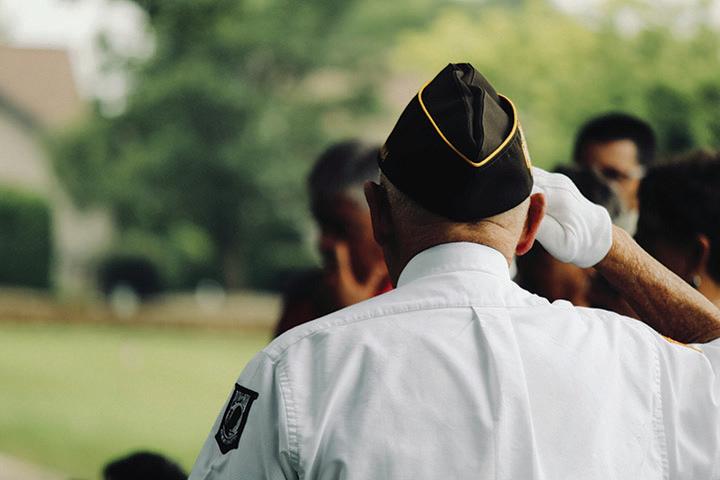
the copayment costs of the first three mental health appointments for veterans through December 2027.
through Dec. 29, 2027. The benefit reduces veterans’ personal expenses and increases their access to behavioral health care.
To qualify for this benefit, the patient’s treatment must be conducted by a licensed mental health professional at Veterans Affairs (VA) or through a network of local healthcare providers. The VA will reimburse veterans for any copays they made on June 27, 2023 and beyond.
According to a VA press release, the Biden-Harris administration aims to provide all veterans with timely,
world-class mental health care. They have recorded a 7 percent decrease in average mental health wait times since April 2024 and have increased veterans care. Furthermore, a survey conducted by VA records that the percentage of veterans who trust VA outpatient care reaches an all time high of 91.8 percent.
“We want every Veteran, regardless of their financial status, to have access to the mental health care they deserve— and that’s what this copayment exemption is all about,” said VA Secretary Denis McDonough, in a statement released by the agency. “We are constantly working to expand access to mental health care, and we won’t rest until every Veteran has access to care whenever and wherever they need it.”
This copay exemption was implemented under the Cleland-Dole Act but is just one of multiple recent efforts to provide quality mental health services to more veterans.
The Veterans Health Administration (VHA) has hired over 9,000 mental health professionals since October 2021, with 2,000 of these hires occurring after October 2023. VHA’s staff retention rates are now at a historical high, with a 63.7 percent retention rate in fiscal year 2022.
Additionally, a policy introduced last year provides free suicide crisis care for qualifying constituents of VA at any emergency health center, providing nine million former service members and veterans with ready access to this emergency service. Sixty thousand individuals have already received millions of dollars’ worth of care through this program.
By Deyane Moses Special to the AFRO
My trip to Richmond, for a symposium and a visit to the Black History Museum’s archives turned into a serendipitous encounter with a fearless publisher of the Black Press: John Mitchell Jr.
Over breakfast at a local cafe, I delved into the history of the Richmond Planet, established in 1882, a decade before the Baltimore AFRO American Newspaper. Founded by 13 formerly enslaved men in the heart of the Confederacy, the paper became a vital voice for Richmond’s Black community. John Mitchell Jr., a young teacher turned editor and activist, took charge in 1884 and remained in power until his death in 1929.
Published in Jackson Ward, Richmond’s Black Wall Street, the Richmond Planet, under Mitchell’s leadership, became a powerful advocate for racial equality. The paper’s masthead, aptly named the “Strong Arm,” embodied Mitchell’s forceful and unwavering commitment to justice. It tackled local, national, and international news, but its core mission under Mitchell exposed the horrors of lynchings, segregation, and the resurgence of the Ku Klux Klan. A fearless man, Mitchell traveled the state reporting atrocities and relentlessly denounced racial prejudice through editorials and scathing political cartoons.
Mitchell’s influence extended beyond the newspaper. He established the Mechanics Savings Bank, a crucial institution for the Black community,
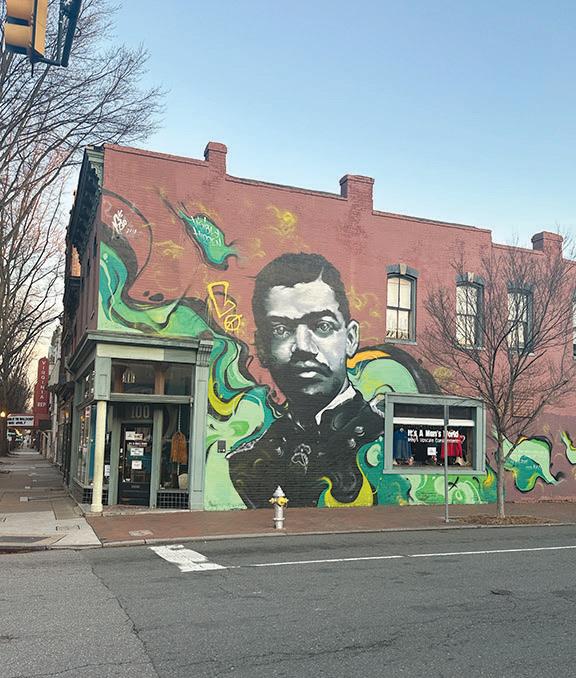
and played a key role in creating the Leigh Street Armory, which housed the African American militia company and later became a school for Black children. This building now stands as the Richmond Black History Museum, a testament to the lasting impact of Mitchell and the Richmond Planet.
Inspired by this discovery, I embarked on a selfguided tour of Richmond’s landmarks associated with Mitchell and the Richmond Planet. The paper’s former headquarters stood just two blocks away from the Cafe, and a powerful mural honoring Mitchell, with the quote “A Man who would walk into the jaws of death to serve his race,” was a block further.
The Virginia Museum of History and Culture offered a window into the past with a single, fragile copy of the Richmond Planet dated April 6, 1901. Its brown tattered pages detailed daily life in Richmond, including church announcements and land sales, alongside a chilling list – 391 names of lynching victims in 1897. Publishing such truths during the oppressive Jim Crow era was a courageous act by Mitchell.
My final stop was the historic Evergreen and East End Cemeteries, where John Mitchell Jr. rested. His headstone was nestled next to his mother, Rebecca Mitchell, and across from Maggie Lena Walker, another pioneering Black leader who shattered barriers by becoming the first Black woman to establish a bank in the United States. Spending time at the cemetery, I felt a deep connection to Mitchell and the ancestors that surrounded me.
This serendipitous encounter with John Mitchell Jr. serves as a powerful reminder. History isn’t confined
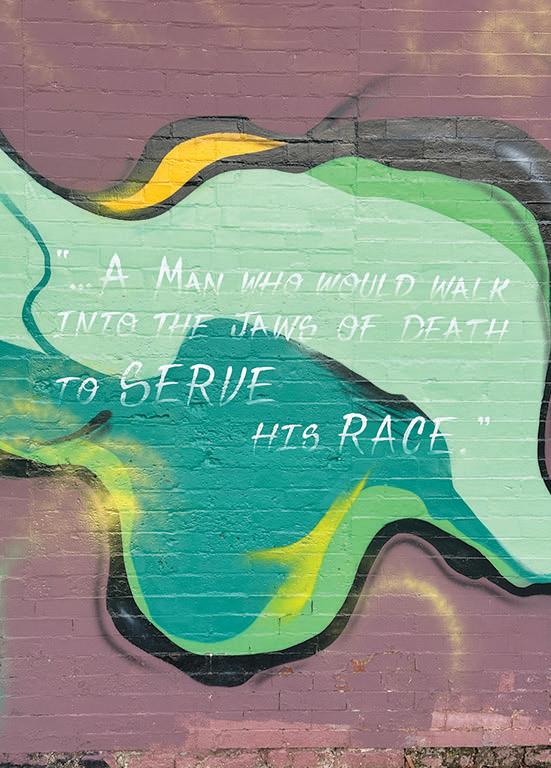
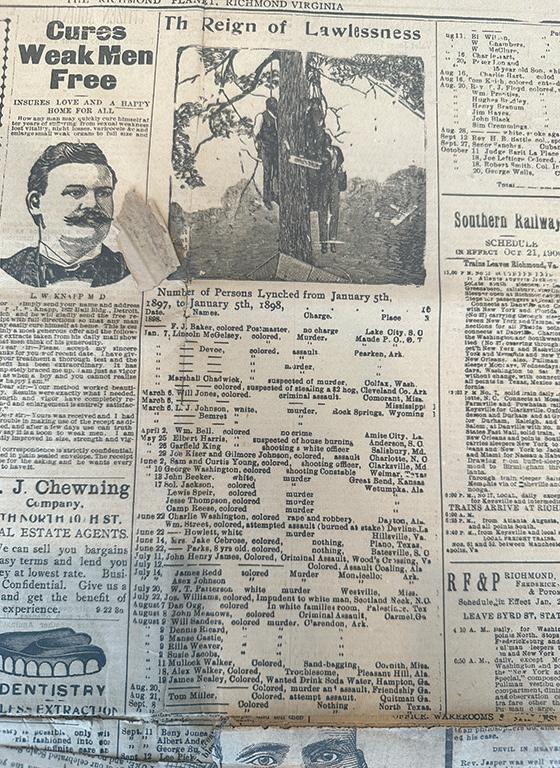
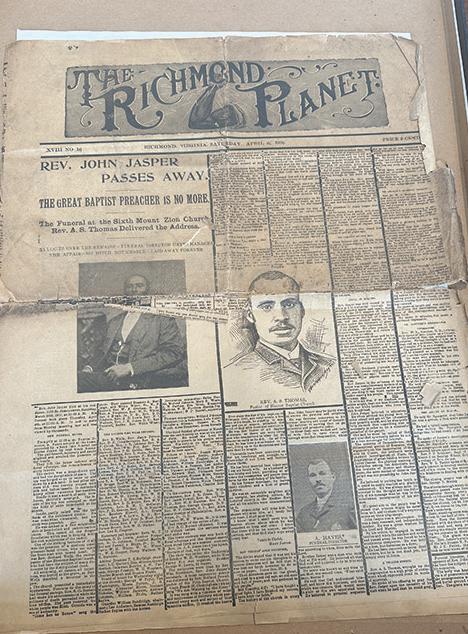
to dusty textbooks; it’s woven into the very fabric of our cities and communities. At Afro Charities, we are dedicated to preserving these stories, amplifying the voices of the past, and educating future generations.
Mitchell’s 161st birthday, on July 11, presents a unique opportunity to celebrate his achievements and reflect on the ongoing struggle for racial equality. Perhaps this date could be designated as a day of remembrance, a call to action for continued progress.
John Mitchell Jr.’s story is a testament to the relentless pursuit of justice. While publications like the Richmond Planet, which later merged in 1938 to become the Richmond AFRO, may no longer exist, their legacy lives on in the institutions they built and the voices they empowered. Organizations like Afro Charities, the sister company of the AFRO American Newspapers, play a crucial role in ensuring these stories inspire future generations.
This month, consider supporting Afro Charities or similar local organizations dedicated to uplifting Black history and empowering communities.
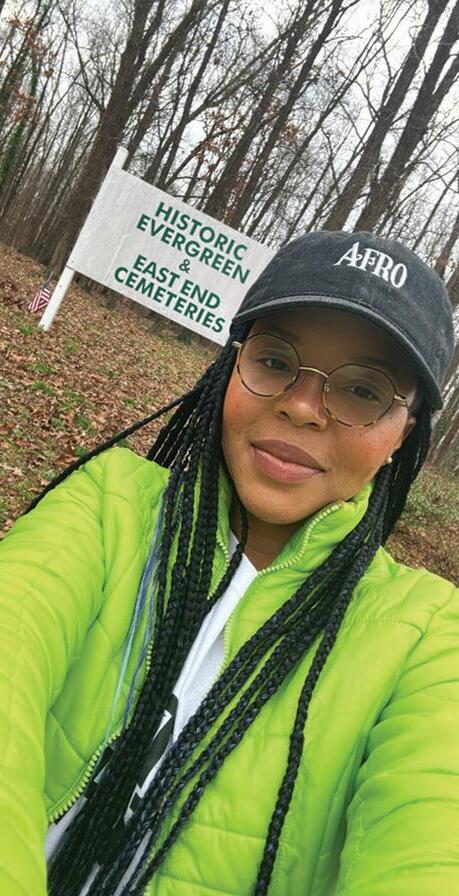
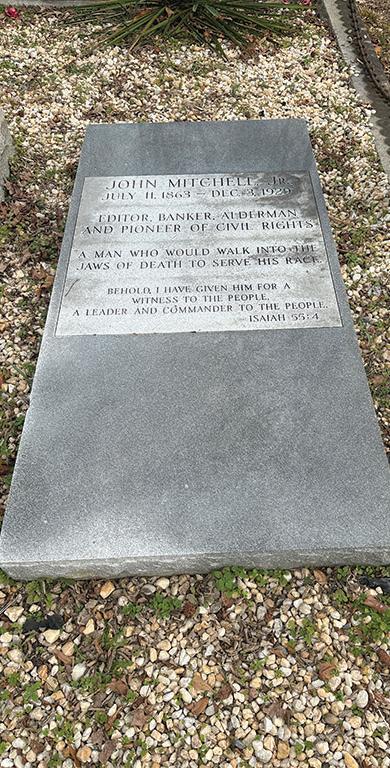

SUPERIOR COURT OF THE DISTRICT OF COLUMBIA PROBATE DIVISION ADMINISTRATION NO. 2024ADM000203
EVERETT WARREN HUGHES II Name of Decedent Notice of Appointment, Notice to Creditors and Notice to Unknown Heirs
AVA HUGHES BOOKER, whose address is 6116
ROSEMONT CIRCLE NORTH BETHESDA MD 20852, was appointed Personal Representative of the estate of EVERETT WARREN HUGHES II, who died on NOVEMBER 23, 2021 without a Will and will serve without Court supervision. All unknown heirs and heirs whose whereabouts are unknown shall enter their appearance In this proceeding. Objections to such, appointment shall be filed With the Register of Wills, D.C., Building A, 515 5th Street, N.W., 3rd Floor, Washington, D.C. 20001, on or before SEPTEMBER 22, 2024. Claims against the decedent shall be presented to the undersigned with a copy to the Register of Wills or filed with the Register of Wills with a copy to the undersigned, on or before SEPTEMBER 22, 2024 or be forever barred. Persons believed to be heirs or legatees of the decedent who do not receive a copy of this notice by mail within 25 days of its publication shall so inform the Register of Wills, including name, address and relationship. Date of first publication: MARCH 22, 2024 Name of newspaper and/or periodical: Daily Washington Law Reporter AFRO American Newspapers
AVA HUGHES BOOKER Personal Representative TRUE TEST COPY REGISTER OF WILLS 3/22, 3/29, 4/05/24
SUPERIOR COURT OF THE DISTRICT OF COLUMBIA PROBATE DIVISION ADMINISTRATION NO. 2024ADM000721
GODFREY A. SWINDALL Name of Decedent Notice of Appointment, Notice to Creditors and Notice to Unknown Heirs
or before DECEMBER 21, 2024. Claims against the decedent shall be
to the undersigned with a copy to
of Wills with
DECEMBER 21,
of Wills or
with the
to the undersigned, on or
or
be heirs or legatees of the decedent who do not receive a copy of this notice by mail within 25 days of its publication shall so inform the Register of Wills, including name, address and relationship. Date of first publication: JUNE 21, 2024 Name of newspaper and/or periodical: Daily Washington Law Reporter AFRO American Newspapers
HARVEY R. MOORE CLAUDIA M. PAYNE Personal RepresentativeS TRUE TEST COPY REGISTER OF WILLS 6/21, 6/28, 7/05/24
SUPERIOR COURT OF THE DISTRICT OF COLUMBIA PROBATE DIVISION ADMINISTRATION NO. 2024ADM726 DAISY B. SUITT Name of Decedent Notice of Appointment, Notice to Creditors and Notice to Unknown Heirs
DENISE
DENISE S. ANTHONY
GWENDOLYN L. SWINDALL, whose address is 201 I STREET NE #210 WASHINGTON DC 20002 was appointed Personal Representative of the estate of GODFREY A. SWINDALL, who died on MAY 14, 2024 without a Will and will serve without Court supervision. All unknown heirs and heirs whose whereabouts are unknown shall enter their appearance In this proceeding. Objections to such, appointment shall be filed With the Register of Wills, D.C., Building A, 515 5th Street, N.W., 3rd Floor, Washington, D.C. 20001, on or before DECEMBER 28, 2024. Claims against the decedent shall be presented to the undersigned with a copy to the Register of Wills or filed with the Register of Wills with a copy to the undersigned, on or before DECEMBER 28, 2024 or be forever barred. Persons believed to be heirs or legatees of the decedent who do not receive a copy of this notice by mail within 25 days of its publication shall so inform the Register of Wills, including name, address and relationship. Date of first publication: JUNE 28, 2024 Name of newspaper and/or periodical: Daily Washington Law Reporter AFRO American Newspapers
GWENDOLYN L. SWINDALL Personal Representative
TRUE TEST COPY REGISTER OF WILLS 6/28, 7/05, 7/12/24
SUPERIOR COURT OF THE DISTRICT OF COLUMBIA PROBATE DIVISION ADMINISTRATION NO. 2024ADM734
JUANDA DALE SMITH Name of Decedent Notice of Appointment, Notice to Creditors and Notice to Unknown Heirs
PENNY SAMUDA, whose address is 12519 BREWSTER LANE BOWIE, MD 20715 was appointed Personal Representative of the estate of JUANDA DALE SMITH, who died on MAY 16, 2024 without a Will and will serve without Court supervision. All unknown heirs and heirs whose whereabouts are unknown shall enter their appearance In this proceeding. Objections to such, appointment shall be filed With the Register of Wills, D.C., Building A, 515 5th Street, N.W., 3rd Floor, Washington, D.C. 20001, on or before DECEMBER 28, 2024. Claims against the decedent shall be presented to the undersigned with a copy to the Register of Wills or filed with the Register of Wills with a copy to the undersigned, on or before DECEMBER 28, 2024 or be forever barred. Persons believed to be heirs or legatees of the decedent who do not receive a copy of this notice by mail within 25 days of its publication shall so inform the Register of Wills, including name, address and relationship. Date of first publication: JUNE 28, 2024 Name of newspaper and/or periodical: Daily Washington Law Reporter AFRO American Newspapers
PENNY SAMUDA
Personal Representative
TRUE TEST COPY REGISTER OF WILLS 6/28, 7/05, 7/12/24
SUPERIOR COURT OF THE DISTRICT OF COLUMBIA PROBATE DIVISION ADMINISTRATION NO. 2024ADM727 RAYMOND ESPEUT AKA RAYMOND ANTHONY ESPEUT Name of Decedent
KARL L. CHEN C/O CHEN LAW, LLC 9701 APOLLO DRIVE SUITE 381 LARGO, MARYLAND 20774 Notice of Appointment, Notice to Creditors and Notice to Unknown Heirs
BARBARA FISHER, whose address is 7119 LOIS
LANE, LANHAM MARYLAND 20706 was appointed Personal Representative of the estate of RAYMOND ESPEUT AKA RAYMOND ANTHONY ESPEUT, who died on JANUARY 06, 2024 with a Will and will serve without Court supervision. All unknown heirs and heirs whose whereabouts are unknown shall enter their appearance In this proceeding. Objections to such, appointment shall be filed With the Register of Wills, D.C., Building A, 515 5th Street, N.W., 3rd Floor, Washington, D.C. 20001, on or before DECEMBER 28, 2024. Claims against the decedent shall be presented to the undersigned with a copy to the Register of Wills or filed with the Register of Wills with a copy to the undersigned, on or before DECEMBER 28, 2024 or be forever barred. Persons believed to be heirs or legatees of the decedent who do not receive a copy of this notice by mail within 25 days of its publication shall so inform the Register of Wills, including name, address and relationship.
Date of first publication: JUNE 28, 2024 Name of newspaper and/or periodical: Daily Washington Law Reporter AFRO American Newspapers
BARBARA FISHER Personal RepresentativeS TRUE TEST COPY REGISTER OF WILLS 6/28, 7/05, 7/12/24
SUPERIOR COURT OF THE DISTRICT OF COLUMBIA PROBATE DIVISION ADMINISTRATION NO. 2024ADM000711 THELDA BROWN Name of Decedent Notice of Appointment, Notice to Creditors and Notice to Unknown Heirs PHILLIP BROWN, whose address is 11804 BIGNONIA TERRACE, LAUREL MD 20708 was appointed Personal Representative of the estate of THELDA BROWN, who died on JULY 29, 2005 without a Will and will serve with Court supervision. All unknown heirs and heirs whose whereabouts are unknown shall enter their appearance In this proceeding. Objections to such, appointment shall be filed With the Register of Wills, D.C., Building A, 515 5th Street, N.W., 3rd Floor, Washington, D.C. 20001, on or before DECEMBER 28, 2024. Claims against the decedent shall be presented to the undersigned with a copy to the Register of Wills or filed with the Register of Wills with a copy to the undersigned, on or before DECEMBER 28, 2024 or be forever barred. Persons believed to be heirs or legatees of the decedent who do not receive a copy of this notice by mail within 25 days of its publication shall so inform the Register of Wills, including name, address and relationship.
Date of first publication: JUNE 28, 2024 Name of newspaper and/or periodical: Daily Washington Law Reporter
AFRO American Newspapers
PHILLIP BROWN Personal Representative
TRUE TEST COPY REGISTER OF WILLS 6/28, 7/05, 7/12/24
SUPERIOR COURT OF THE DISTRICT OF COLUMBIA PROBATE DIVISION
2024ADM737 Estate of TIMOTHY ELLIOTT Deceased NOTICE OF STANDARD PROBATE
(For estates of decedents dying on or after July 1, 1995)
Notice is hereby given that a petition has been filed in this Court by KARIMAH WARE EDWARDS for standard probate, including the appointment of one or more personal representatives. Unless a responsive pleading inthe form of a complaint or an objection in accordance with Superior Court Probate Division Rule 407 is filed in this Court within 30 days from the date of first publication of this notice, the Court may take the action hereinafter set forth.
*in the absence of will or proof satisfactory to the Court of due execution, enter an order determing that the decendent died intestate
*appoint an unsupervised personal representitive
*ordering intrested persons to prove heirship
Date of first publication: JUNE 28, 2024
Names of newspapers: Daily Washington Law Reporter
AFRO American Newspapers
TYECHIA L. WHITE ESQ.
300 NEW JERSEY AVE NW SUITE 300 WASHINGTON, DC 20001
Signature of Petitioner/Attorney
Register of Wills Clerk of the Probate Division 6/28, 7/05/24
SUPERIOR COURT OF THE DISTRICT OF COLUMBIA PROBATE DIVISION ADMINISTRATION NO. 2024ADM000714 WARREN BROWN Name of Decedent Notice of Appointment, Notice to Creditors and Notice to Unknown Heirs
PHILLIP BROWN, whose address is 11804 BIGNONIA TERRACE, LAUREL MD 20708 was appointed Personal Representative of the estate of WARREN BROWN, who died on APRIL 28, 2001 without a Will and will serve without Court supervision. All unknown heirs and heirs whose whereabouts are unknown shall
STEPHEN LEE SNYDER Name of Decedent Notice of Appointment, Notice to Creditors and Notice to Unknown Heirs KAREN SNYDER, whose address is 3236 WALBRIDGE PL NW WASHINGTON, DC 20010 was appointed Personal Representative of the estate of STEPHEN LEE SNYDER, who died on FEBRUARY 16, 2024 with a Will and will serve without Court supervision. All unknown heirs and heirs whose whereabouts are unknown shall enter their appearance In this proceeding. Objections to such, appointment shall be filed With the Register of Wills, D.C., Building A, 515 5th Street, N.W., 3rd Floor, Washington, D.C. 20001, on or before JANUARY 05, 2025. Claims against the decedent shall be presented to the undersigned with a copy to the Register of Wills or filed with the Register of Wills with a copy to the undersigned, on or before JANUARY 05, 2025 or be forever barred. Persons believed to be heirs or legatees of the decedent who do not receive a copy of this notice by mail within 25 days of its publication shall so inform the Register of Wills, including name, address and relationship. Date of first publication: JULY 05, 2024 Name of newspaper and/or periodical: Daily Washington Law Reporter AFRO American Newspapers
KAREN SNYDER Personal Representative
TRUE TEST COPY REGISTER OF WILLS 7/05, 7/12, 7/19/24

THE DISTRICT OF COLUMBIA HOUSING AUTHORITY
REQUEST FOR PROPOSALS (RFP) SOLICITATION NO.: 0037-2024
VIDEO SURVEILLANCE SERVICES
The District of Columbia Housing Authority (DCHA) requires professional Video Surveillance Services at various DCHA properties.
SOLICITATION DOCUMENTS will be available beginning Monday, July 1, 2024 on DCHA’s website at www.dchousing.org under “Business” and “Solicitations”.
SEALED PROPOSAL RESPONSES ARE DUE ON OR BEFORE Tuesday, July 16, 2024 at 11:00 AM.
Email Lolita Washington, Contract Specialist at lwashing@dchousing. org with copy to business@dchousing.org for additional information.
THE DISTRICT OF COLUMBIA HOUSING AUTHORITY
REQUEST FOR PROPOSAL (RFP) SOLICITATION NO.: 41-2024
JANITORIAL SERVICES FOR SELECT DCHA BUILDINGS
The District of Columbia Housing Authority (DCHA) requires a qualified contractor to furnish the necessary labor, materials, supplies, equipment and supervision to provide janitorial services for (32) DCHA Service Locations and Properties.
SOLICITATION DOCUMENTS will be available beginning Monday, July 1, 2024, on DCHA’s website at www.dchousing.org under “Business” and “Solicitations”.
SEALED BID RESPONSES ARE DUE ON OR BEFORE Monday, July 22, 2024, at 11:00AM.
Email LaShawn Mizzell-McLeod, Contract Specialist at LMMCLEOD@ dchousing.org withcopy to business@dchousing.org for additional information.


Policy for legal notice advertisements. Effective immediately, The Afro American Newspapers will require prepayment for publication of all legal notices Payment will be accepted in the form of checks, credit card or money order. Any returned checks will be subject to a $25.00 processing fee and may result in the suspension of any future advertising at our discretion.
On or after June 17, 2024, Plans and Specifications may be obtained from the Anne Arundel County Web Page at the following address: https://www.aacounty.org/departments/ central-services/purchasing/P.O.R.T./bids/index.html . Bids will be received until time/date shown below, please submit your bid electronically via the PORT. Bids received after the date and time set will be rejected.
Due by 1:30 p.m. Local Time, Tuesday, July 30, 2024
Project: P587901 – Tanyard Springs Park Development
Sonication No.: CAP24000396
Contact: Kathryn Garafola – 443-336-4648




By Madeleine Seck
Intern
AFRO
mseck@afro.com and Tierra Stone
AFRO Intern
tierrastone@afro.com
As summer kicks into high gear, the AFRO is encouraging all readers– young and old– to take advantage of all of the opportunities offered in the month of July. From health and job fairs to free yoga classes and eye exams for youths, take a look below and see what’s happening near you!
Veterans’ Health and Career Resource Fair
Bring your military identification card and learn about available resources, benefits and health education offered to veterans. Arrive early to receive a free massage.
Date: Saturday, July 20
Time: 11:30 a.m. - 3 p.m
Location: 1501 South Clinton Street Suite 100 Baltimore, MD 21224
Cost: Free
Transformation Health 1st Annual Healing Spring Jam
Maryland Physicians Health is hosting its first annual health spring jam at Transformation Health Outpatient Mental Health Clinic. Staff members will be on hand with information on qualifying for Medicaid coverage and more.
Date: July 20
Time: 10 a.m. - 3p.m.
Location: Transformational Health Parking Lot 312 North Martin Luther King Jr. Boulevard Baltimore, MD 21201
Cost: Free
2nd Annual 2024 Baltimore City Generational Health Summit
Enjoy a day of fitness as the Baltimore City Generational Health Summit partners with the Baltimore City Recreation and Parks. Attendees will have access to health, workout and nutrition services.
Date: July 21
Time: 10 a.m. - 3 p.m.
Location: 4001 Clifton Avenue Baltimore, MD 21216
Cost: Free
Virtual Baltimore Job Fair
A virtual job fair is taking place for those seeking jobs and new career paths in Baltimore City. This is a great opportunity to network, speak with employers and learn about available positions.
Date: Thursday, July 25
Time: 10 a.m. - 2 p.m.
Location: Online
Cost: Free Baltimore County
Yoga for Beginners
Come learn basic yoga techniques and several breathing exercises in order to maintain health and wellness. The event will also be altered for any visitors that would like to use a chair. Using a yoga mat is optional.
Date: July 19
Time: 2 p.m. - 3p.m.
Location: 9833 Greenside Drive Cockeysville, MD 21030
Cost: Free
Early Explorers
This event is perfect for kids that are curious about their surroundings by using arts and crafts to ignite their imagination. All kids must be accompanied by an adult.
Date: July 20
Time: 11 a.m. - 12 p.m.

Several events will take place in the Washington, D.C., Maryland and Virginia (DMV) area in July, ranging from job fairs to panel discussions and networking events.
Location: County Campus Metro Center at Owings Mills 10302 Grand Central Avenue Owings Mills, MD 21117
Cost: Free
Vision to Learn: Free Eye Exams and Glasses
Non-profit organization Vision to Learn will be providing free eye exams and glasses to children from low income families. The organization requests that all children must be able to identify shapes and letters in order to continue with their appointment.There are minimal options for teen and adult frames. Registration and consent forms can be acquired from all library branches and must be signed by parent or guardian.
Date: July 22
Time: 9 a.m. - 3 p.m.
Location: 855 Sulphur Spring Road Arbutus, MD 21227
Cost: Free
Two Truths and a Lie: Separating Facts from Fiction
The Perry Hall Library Branch will be hosting three interactive workshops to help visitors learn about how to stop the spread of disinformation, and how it affects the community as a whole. All visitors are encouraged to be social and encourage one another’s opinions. Light refreshments will be served at 5:15p.m. Registration is required online.
Date: July 23
Time: 5:30 - 7 p.m.
Location: 9685 Honeygo Boulevard Perry Hall, Maryland 21128
Cost: Free
Let’s Talk: Breaking the Cycle of Gun Violence
Join The Muslim Legal Support Centre as they chat about learning your rights and understand how gun violence affect your community
Date: July 26
Time: 1 p.m. - 2:30 p.m.
Afro Latino Festival 2024
Celebrate Afro-Latino, African, and Caribbean heritage with music and art. This family-friendly event will include live music, international food vendors, crafts and more.
Date: July 21
Time:12 p.m. - 9 p.m.
Location: 1 Veterans Pl, Silver Spring, MD 20910
Cost: Free Admission
“And How Are the Children?” Panel Discussion + Q&A!
House Bill 814 crossed with Senate Bill 744 was signed by Gov. Wes Moore on May 16, 2024. HB814 is an act concerning juvenile justice reformation that changes policies in certain jurisdictions regarding children in custody. Going into effect on November 1, this event will review the bill. Those who want to make a political difference learn about HB814 and how it would be harmful to minors in Maryland.
Date: Tuesday, July 23
Time: 6 p.m.
Location: Prince George’s Community College 301 Largo Road, Largo, MD 20774 Chesapeake Hall, Room 109
Cost: Free
Upper Marlboro MD Food Distribution Event / Distribución de Alimentos
For those in need, Upper Marlboro is hosting a food distribution. Fruit and vegetables will be handed out to the community.
Date: July 26
Time: 6 p.m. - 7:30 p.m.
Location: Ministerio Edificando la Familia 8325 Old Marlboro Pike Unit-A13 Upper Marlboro, MD 20772
Cost: Free
Knights of Columbus Tri-Chapter Food Packing Event
The Cross Catholic Outreach is partnering with the Knights of Columbus to help package food for families living in developing countries. This event will take place at the St. Philip the Apostle Church Gym. Bring all of your family and friends and help make a positive impact on those in need.
Date: Saturday, July 27
Timeslots: 8 a.m. - 12 p.m. and 12 p.m - 3 p.m
Location: Columbus Gardens 4301 Klosterman Avenue Nottingham, MD 21236
Cost: Free
Sisters of the Soil, Volunteer With Our Vegetable Farm
Volunteer at the Watkins Park vegetable farm and grow some delicious organic plants. Don’t forget to dress in clothes you wouldn’t mind getting dirty.
Date: Every Saturday morning through October 26
Time: 11 am
Location: Watkins Park 301 Watkins Park Dr. Upper Marlboro, MD 20774
Cost: Free
Washington Career and Job Fair
For those interested in a career or job in the healthcare field, this is the perfect opportunity to network and interview within the Washington, D.C. area. Using JobFairX, the attendees can navigate opportunities virtually.
Date: July 17
Time: 11 a.m .- 3 p.m.
Location: Online
Cost: Free
City of Fairfax Police Department: Police Officer Recruiting Event
Have you always wanted to help protect and serve your local community? If so, make sure to drop by this hiring event hosted by The City of Fairfax Police Department. Throughout this event, there will be representatives available to answer any questions as well as help attendees with the application process.
Date: July 31
Time: 5 p.m. - 7 p.m.
Location: City of Fairfax Police Station
3730 Blenheim Boulevard Fairfax, VA 22030
Cost: Free
By Megan Sayles AFRO Business Writer msayles@afro.com
In January, the Federal Trade Commission (FTC) delivered an opinion and final order prohibiting Intuit, parent company to TurboTax, from advertising its services as “free” unless they are free to all customers, or if stipulations are clearly communicated. The directive came after an investigation into deceptive advertising claims against the global financial technology company.
Intuit has since appealed the FTC ruling in the U.S. Court of Appeals for the Fifth Circuit. In response, D.C. Attorney General Brian L. Schwalb and Illinois Attorney General Kwame Raoul, alongside 22 state attorneys general, filed a brief calling for the appeal to be rejected on June 24.
“Intuit misled taxpayers in D.C. and across the country with ads falsely claiming TurboTax was free,” said Schwalb in a statement. “Preying upon low-income taxpayers and military families who were eligible to file their taxes at no cost, Intuit pocketed millions of dollars in profit. The FTC’s cease and desist order protects consumers from this type of unacceptable, illegal conduct.”
Intuit previously
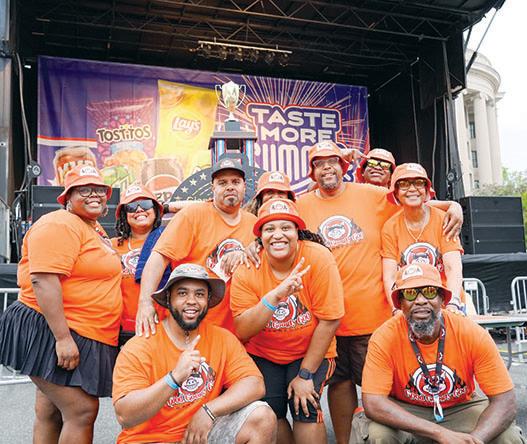
By Amber D. Dodd Special to the AFRO adodd@afro.com
Amid a major heat wave, 35 teams further turned up the heat June 23 during the 32nd Annual Giant National Capital Barbecue Battle, a delicious competition featuring categories such as best pork, brisket, chicken and original sauce, which was held in downtown Washington, D.C.
For the Good Googly Goo BBQ team, after a long day toiling over hot coals, their competitive fire waned—unlike the sun’s heat.
Both a vendor and competitor, Norris “Syd” Sydnor, founder of Good Googly Goo, worked until he couldn’t.
“Last night, I was ready to throw the towel in on the competition,”
Sydnor said. “It was 2 a.m., no sleep, just been in the hot sun all day. I dug down deep and got some willpower somewhere.”
The work paid off. Sydnor and the Good Googly Goo crew were named the barbecue battle’s grand champion, earning their title by
“It’s my ancestors that give me inspiration. I didn’t see many people of color in these competitions yet, historically, we are the backbone of what started barbecue.”
placing in a series of subcategories.
“It means so much to get this championship right here in the nation’s capital,” said Sydnor, a
Mitchesville, Md. native.
During the Giant BBQ battle, Sydnor and other Black barbecue gurus sat down with the AFRO to talk about the Black history behind the beloved summer staple, and how slavery began the American tradition known today as “barbecue.”
“It’s my ancestors that give me inspiration,” Sydnor said. “I didn’t see many people of color in these competitions yet, historically, we are the backbone of what started barbecue.”
According to Food Network, the etymology of barbecue is found in indigenous terminology like “barbacoa.” The Taino, or the Caribbean Spanish indigenous group inhabiting Hispaniola, would prepare animals for meals by slowly roasting them and cooking them under fire.
Barbecue’s American roots begin in slavery when enslaved cooks would prepare meals for others on the plantation, using meat unwanted
By Tashi McQueen
AFRO Political Writer
tmcqueen@afro.com
The Prince George’s County Council recently released two dates for special elections to replace former Council Member Jamel “Mel” Franklin who resigned on June 14.
“After nearly 14 years of service, At-Large Council Member Mel Franklin has resigned his position. Franklin served two terms representing District 9 beginning in December 2010, before being elected twice as an At-Large Council Member,” said Jennifer A. Jenkins, Prince George’s County Council administrator, in a statement on June 14. “We thank Council Member Franklin for his years of dedication, hard work and service.”
“We are committed to a smooth transition for the benefit of our residents,” she continued.
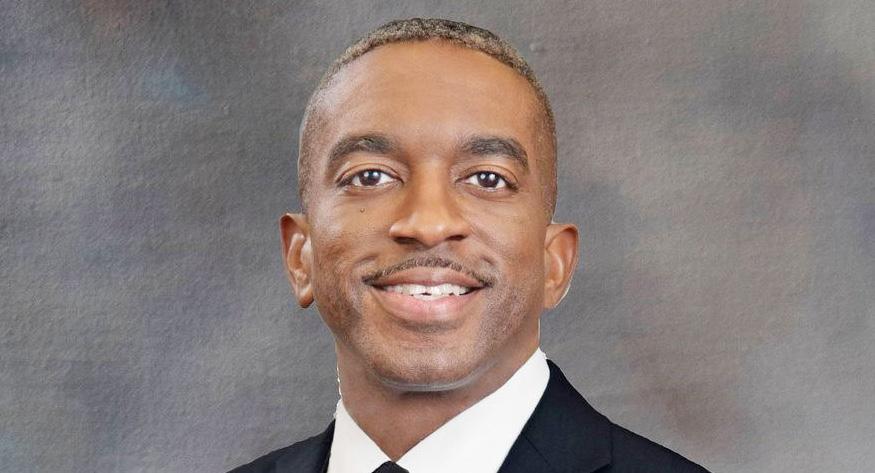
“Our office strives to hold individuals in positions of public trust accountable if they violate that trust and exploit the Maryland electoral process for personal financial gain,” said Howard in a statement on June 20.
According to the document, Franklin is accused of embezzling
By Mekhi Abbott AFRO Sports Intern mabbott@afro.com
on
mentor and community leader died in his home, located in northwest D.C. McAdams was a true pillar of the D.C. sports community. The District of Columbia State Athletic Association (DCSAA) and Metropolitan Basketball Hall of Famer became one of the most respected names in the DMV sports media scene with his highly celebrated sports radio talk show “In and Out of Sports.”
“We lost an icon and legendary voice of sports and talk radio. Coach McAdams was a voice who wasn’t afraid to say what and how he felt and Community mourns death of D.C. Basketball Hall of Famer James ‘Butch’ McAdams
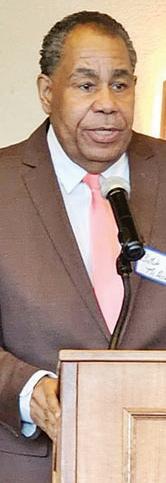
and
of
and

Continued from D1
“[They had] real tough cuts of meats and they had to learn how to cook it,” Sydnor said.
Though the barbecue battle featured mostly mid-Atlantic competition teams, American barbecue’s Black, Southern roots did not go unnoticed, especially by festival goers such as Jordan Howard, an Athens, Ga. native.
“I’m from the South; we eat a lot of pork, so seeing what different areas have good or bad barbecue, it’s a pretty fun time,” Howard said. “It’s cool to see that the South is this far north with our food influence.”
As a vendor, NC Ribs on Wheels presented North Carolina’s barbecue traditions. Its owner, lifelong cook Angus Thompson, has run the business for 14 years, competing in various barbecue competitions.
“We always have barbecue
Continued from D1
battles down in Lexington, N.C., because it’s in the middle of the state,” Thompson said. “One of the unique things about North Carolina is ‘whole hog.’ We grew up cooking it on a metal bed frame. We’d dig a hole; we flattened the pig out.”
North Carolina’s barbecue features two different styles: vinegar-based and tomato-based.
“The state is split right down the middle: the east is known for the vinegar-based barbecue, and the west is known for the ketchup-based,” Thompson said.
Thompson, a Fairmont, N.C. native, prefers a vinegarbased barbecue, just like his mentor, his great-uncle Hayward Thompson.
“People ask if we do a mustard-based sauce, I say ‘No, but I can give you some ketchup to put on a hot dog,’” Thompson joked.
settled with a coalition of 50 states and D.C. in 2022, resolving state probes into allegations that the company misled consumers about TurboTax’s services. The agreement included $141 million for Americans who paid to file their taxes on TurboTax when the software should have been free. Nearly 4.4 million customers across the country received a payment, according to Intuit.
A few months before the January
“Intuit misled taxpayers in D.C. and across the country with ads falsely claiming TurboTax was free.”
opinion and final order, the FTC’s Chief Administrative Law Judge D. Michael Chappell ruled that Intuit participated in deceptive advertising. He ordered a cease and desist on these alleged practices.
Representatives from Intuit have concerns surrounding the objectivity of the judgment, particularly because it was the FTC that lodged the suit and a judge
Continued from D1 or unused by slave masters.
A self-proclaimed “old schooler,” he never strays away from North Carolina’s barbecue ways of his great- uncle.
“He taught me to move the coals—don’t get them too hot, don’t get them too cold,” Angus Thompson recalled. “When I was growing up, he had a garden…we used to go and get the white vinegar and let it sit for six, seven, eight days.”
Awaiting the results from the barbecue judges, 82-yearold D.C. native Andrew Majett, owner of Ribs by Andy, sat close to the trophy table. Majett’s love for barbecue began with the freedom his grandmother, Sadie Pankey, granted him to cook whatever he wanted in her kitchen. Now, many years later, Majett has created his own dry rub for Ribs by Andy and won awards in grilling and smoking. He’s competed in cooking
contests for 30 years. In the District’s edition of barbecue, Majett said it reflects the melting pot of the nation’s capital. “It’s a mix of different places, flavors and seasonings,” said Majett, who grew up in the Brightwood area. “[Competitions] open my horizon up. You have people from all different cultures of life, and everybody eats food.”
When discussing barbecue’s roots, Majett pointed to the history of Black American culture being appropriated and generalized as American culture, something he finds happening in barbecue culture often.
“Barbecue actually started during slavery, most people don’t know that and won’t accept it because they don’t want to accept that Black people or people of color discovered
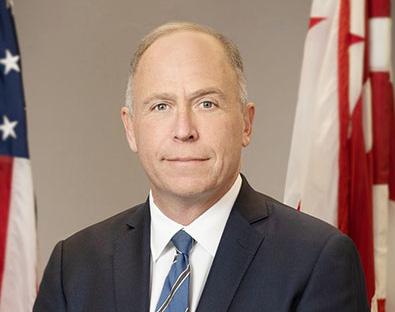
the FTC’s
employed by the agency who issued the ruling.
“We resolved the core of the FTC’s complaint against us more than two years ago with the settlement with all of the state attorneys general,” said Derrick Plummer, a spokesperson for Intuit. “The FTC’s five-year escapade against us is an overreach and waste of taxpayer dollars. Intuit has always been clear and fair with our customers.”
“We have appealed the FTC’s
always stood tall on his outlook and opinions. Coach Butch McAdams will be forever loved and missed throughout the DMV,” said Sean Stinnett, Baltimore native and former director of women’s basketball operations at Bowie State University.
Prior to hosting “In and Out of Sports” in 2011, McAdams’ legacy and impact was first on display as a longtime coach. McAdams began his coaching journey as an assistant coach before he was selected to be the head coach at Maret High School located in northwest D.C.
Over the span of approximately three decades, McAdams coached the Maret basketball team to heights that proved him to be one of the best high school coaches in the D.C. and Maryland area. His teams were ranked as a top 20 team multiple years and several of his players would go on to play Division One basketball. Some of the schools that his athletes went on to play at include the University of Pittsburgh and Virginia Tech.
“He was a [good] coach because of how he was able to pass through history…his connections within the basketball world. He is able to evaluate talent. He’s able to bring people together and he did that on his radio show,” said Michael Tillery, writer and reporter for The Starting Five.
McAdams’ love for basketball and sports in general
anything,” Majett said. “You have people talking about ‘soul’ food, but you’re really talking about food only available to slaves.”
At the end of the award ceremony, Syndor and the Good Googly Goo Crew hoisted their trophy and claimed their prize as this year’s Giant BBQ Battle Grand Champion.
Sydnor gave thanks to his family members, including a friend of his who traveled from Atlanta with his son, and also recognized the historical importance of the Black barbecue community, tracing the ancestral culinary line in one of America’s favorite traditions.
“Cooking this barbecue, it’s in our blood,” Sydnor said. “Our ancestors see us with achievements in barbecue… knowing its backstory, it feels good.”
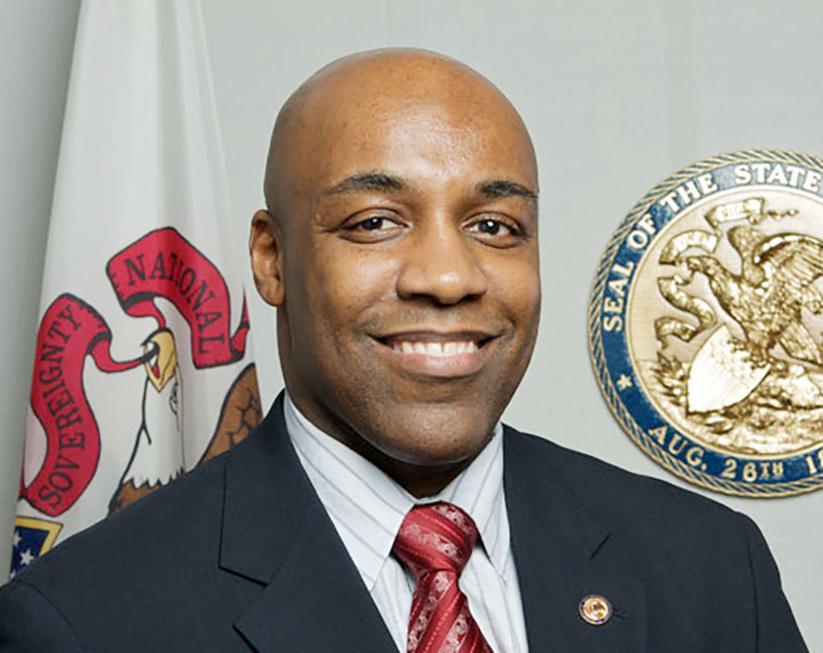
unconstitutional order to the federal appellate court and are confident that when our case is heard, we will win,” he continued.
Attorneys general from Maryland, Maine, Arizona, California, Colorado, Connecticut, Delaware, Hawaii, Massachusetts, Michigan, Minnesota, Nevada, New Jersey, New York, North Carolina, Oregon, Pennsylvania, Rhode Island, Washington and Wisconsin joined Schwalb and Raoul in filing the June brief.
was something that he showed from a very young age. He would go to the playground as a young kid just to inform his friends about what was going on in the sports
“We lost an icon and legendary voice of sports and talk radio. Coach McAdams was a voice who wasn’t afraid to say what and how he felt and always stood tall on his outlook and opinions. Coach Butch McAdams will be forever loved and missed throughout the DMV.”
world. He was an avid reader of the newspaper which strengthened his sports knowledge. The lifelong D.C. resident would go on to play
The officials urged the court to side with the FTC’s opinion.
“Intuit’s arguments in this appeal— which attempt to invalidate the commission’s opinion by claiming that it was not supported by substantial evidence and that the relief the commission ordered was unnecessary given the states’ settlement— would, if adopted, interfere with the states’ interests in preventing deceptive advertising,” wrote the attorneys general in the brief.
basketball at Mackin High School before graduating and moving on to attend the University of the District of Columbia. When McAdams was in high school, Mackin was a powerhouse basketball program.
McAdams had a profound impact on the athletes he coached, sports enthusiasts that regularly tuned into his radio talk show and the greater DMV community.
“Two weeks prior to his death, I was on his radio show alongside Kevin Blackistone. What I appreciate about Coach McAdams first and foremost is his dedication to making sure that the history of Black people and black athletes is being told. He was very diligent in making sure that history was passed down accordingly by getting certain people on his show to explain their eras, their experience in the sports world as well as life in general,” said Tillery.
McAdams also co-hosted “Coach’s Corner,” alongside T.J. Smith, as well as “Coach’s Game Time Conversation,” broadcast on 1010 AM WOLB. He was a contributor to the Larry Young Morning Show in Baltimore. Guest appearances on “In and Out of Sports” include the late, great Georgetown head coach John Thompson and 2017 National Basketball League first overall draft pick Markelle Fultz.
The radio personality is also remembered for his unique fashion sense. James “Butch” McAdams is survived by his wife, Andrea.
By Deborah Bailey AFRO Contributing Editor dbailey@afro.com
The U.S. Africa Collaborative recently held the 2024 Pan African City Exposition on the campus of Bowie State University. The international affordable housing symposium offered an exchange of ideas in search of solutions to the affordable housing crisis across the African Diaspora,
affordable housing issues in Ecuador, Türkiye, South Africa, Australia as well as the U.S.
“We operate based on the African Proverb that says ‘if you want to go fast, go alone. If you want to go far, go together.’ We are going together, and we are trying one step at a time to build bridges across the diaspora,” Glenn said. “The African Diaspora got spread out across the globe. We got disconnected from our past, but it doesn’t mean we have to be disconnected in our future.”
“We operate based on the African Proverb that says ‘if you want to go fast, go alone. If you want to go far, go together.’ We are going together, and we are trying one step at a time to build bridges across the diaspora.”
with emphasis on Africa, the United States (U.S.) and the United Kingdom (UK).
The Collaborative, organized by Maryland native and international housing advocate, Elizabeth Glenn, connects affordable housing advocates across the African Diaspora, from government officials, universities, nonprofits and community-based voices. Glenn, former deputy director of Baltimore County’s Department of Planning has worked on
Glenn and symposium conveners presented a balance between U.S. housing issues and equity and solutions to the worldwide crisis in sustainable, affordable housing.
Both Adrienne Todman, secretary of the U.S. Department of Housing and Urban Development and Dr. Nana Mhlongo, deputy director-general of South Africa’s National Department of Human Settlements addressed the audience and spoke to the deficit in housing for low wealth citizens and the need for innovative solutions.
The U.S. currently has a 7.3-million affordable housing unit shortage, according to the National Low Income Housing Coalition. The backlog of South Africa’s government subsidized settlements is 2.4 million, according to the country’s International Trade Administration. Both countries also face a growing homeless population.
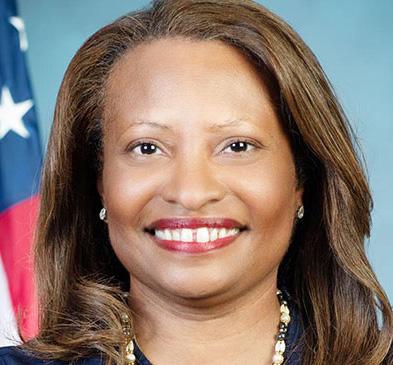

Sanele Mbambo, lecturer at South Africa’s University of the Free State, has been involved with the U.S. Africa Collaborative since the symposium first convened in South Africa in 2022. He came to Maryland to learn how the U.S. tackles its legacy of housing discrimination.
“The United States has a common case with South Africa in terms of racial discrimination. I am quite impressed with how many American organizations and institutions are managing the development of human settlements,” said Mbambo, regarding the 5.2 million U.S. households receiving subsidized housing assistance.
Ayanna Nahmias, founder of Africa Vertical, offered rural solutions for economic empowerment through the farming project she oversees in Zimbabwe. The 200 women connected with Africa Vertical’s sustainable, organic farm, grow food that feeds communities. The farm not only provides the women skills in agriculture, but also supports them in a livelihood through the micro business they operate selling the produce they harvest.
Nahmias, who lives between Northern Virginia and Zimbabwe, first moved to Africa as a child with her parents. She
Continued from D1
$124,450 from the Friends of Mel Franklin campaign committee account from 2020 through October 2023. Franklin allegedly used the funds to pay for personal subscriptions, credit card debt, personal loans and cosmetic procedures for himself and a friend.
According to the charges, from 2021 through December 18, 2023, Franklin was in a similar scheme embezzling $8,719 from the campaign account to third parties to pay for Franklin’s personal expenses.
are committed to a
considers herself a “daughter of Africa,” and began the farm in 2015 after her father’s death in Zimbabwe.
“The Africa vertical farm in Zimbabwe is an alternative to donor dependency,” Nahmias said. “The women involved with the farm are able to grow organic food, feed their families and community, and make a living.”
Nahmias is currently implementing a hydroponic farming model and seeking other countries, including the U.S. where her Zimbabwean farming model can be replicated.
A Pan African housing symposium wouldn’t be complete without song, dance and Capoeira de Angola, a form of AfroBrazilian martial arts. Jonal Lartique, from Richmond, and Troy Thomas, based in metropolitan D.C, taught participants about the highly stylized and rhythmic martial arts form that looks like a choreographed dance.
“This art form is part of the traditional practice that came with us when we came to America,” Lartique said, adding that the demonstration visualized the data and information shared in the symposium workshops. “The healing is in each of us, coming together, working out our past and working toward our future.”



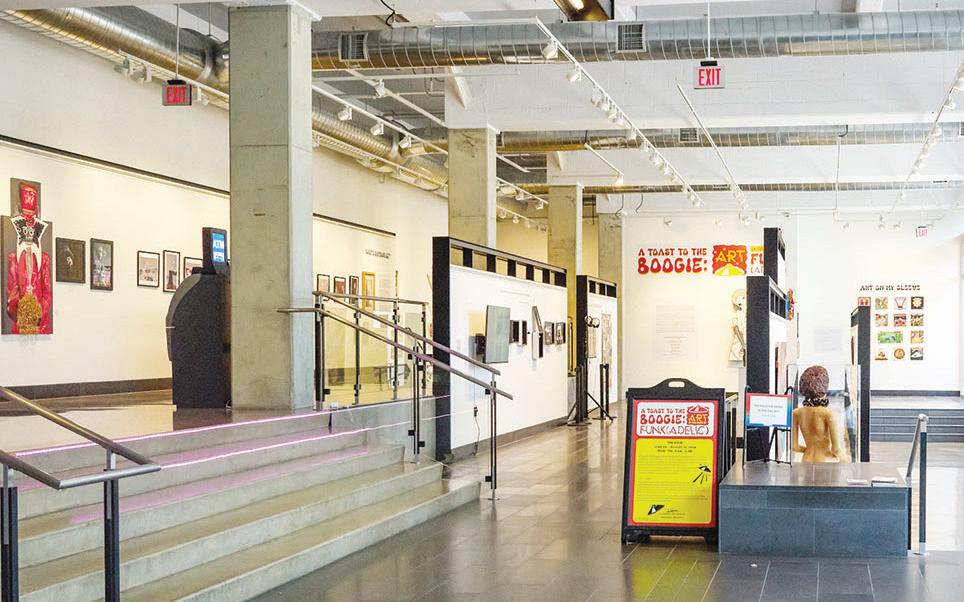
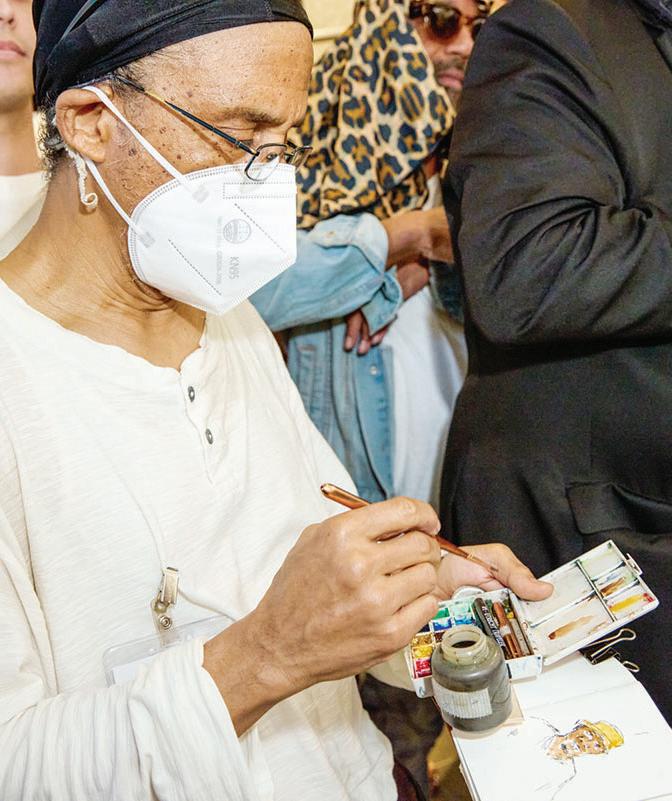
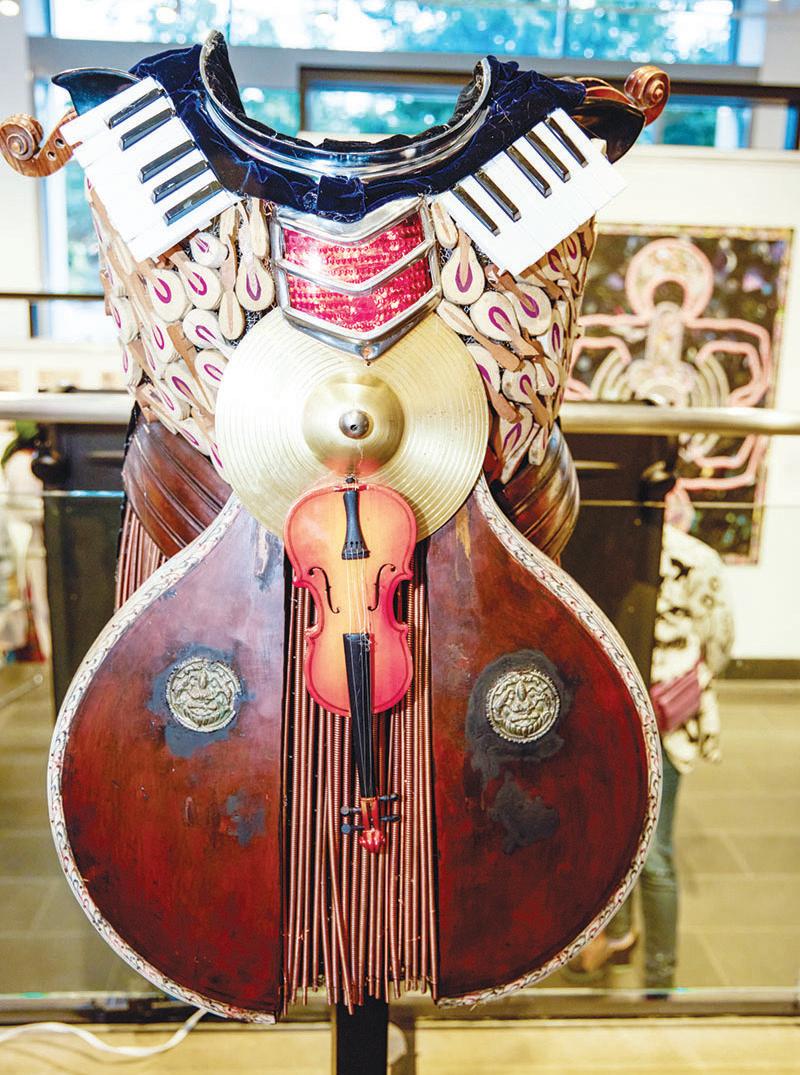

By Aleisha Robinson AFRO Intern arobinson@afro.com
On June 27 the D.C. Commission on the Arts and Humanities (CAH) and the family of George Clinton hosted “A Toast to the Boogie: Art in the Name of Funk(adelic).”
The exhibit showcases rare archival pieces and memorabilia from the Clinton family and work
sourced from D.C. metropolitan artists. These pieces will be on display at the Street Gallery at 200 Street Southeast through Aug 16.
The event hosted a panel discussion with musician and activist George Clinton and Gabrelle German of the Protecting Our Legacy Foundation. They explored Clinton’s work, which has motivated artists and musicians, and spoke on ownership rights for creatives.
All photos by J. Pamela Stills
